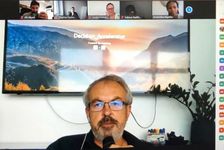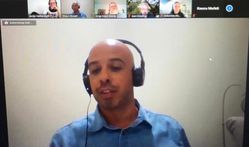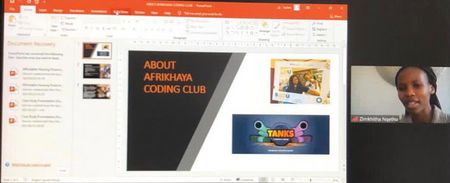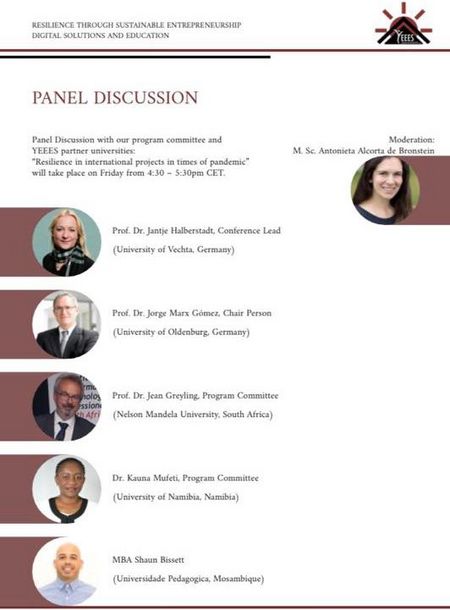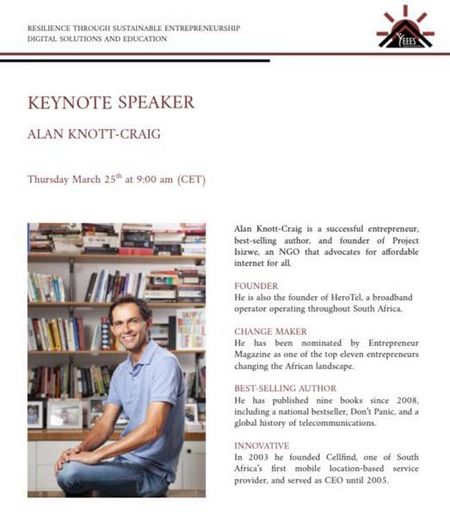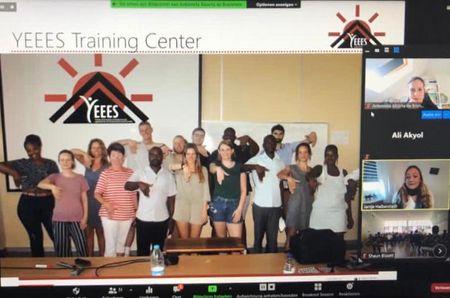2021
2021
News 2021
12.11.2021: The forth HEdIS Summer School in 2022
The fourth HEdIS Summer School 2022 was conducted in the period from 02.11.2021 to 12.11.2021 inclusive and took place under the theme Sustainability in the 4th Industrial Revolution. Besides Jorge Marx Gomez, four students Simon Czapski, Felix Schmedes, Dennis Schulte and Paula Bürmann, as well as a research assistant Sven Lampe participated. The period was divided into two units. While the focus of the first week was on writing scientific texts and took place online, the second part was held at the Monkey Valley Resort in Cape Town. The focus was on the development of a new module with a focus on sustainability and the extension of two modules which came from UCT and NMU.
In addition to the cultural and scientific exchange, we were also able to go on some excursions, such as a hike up Table Mountain or a visit to the Cape of Good Hope.
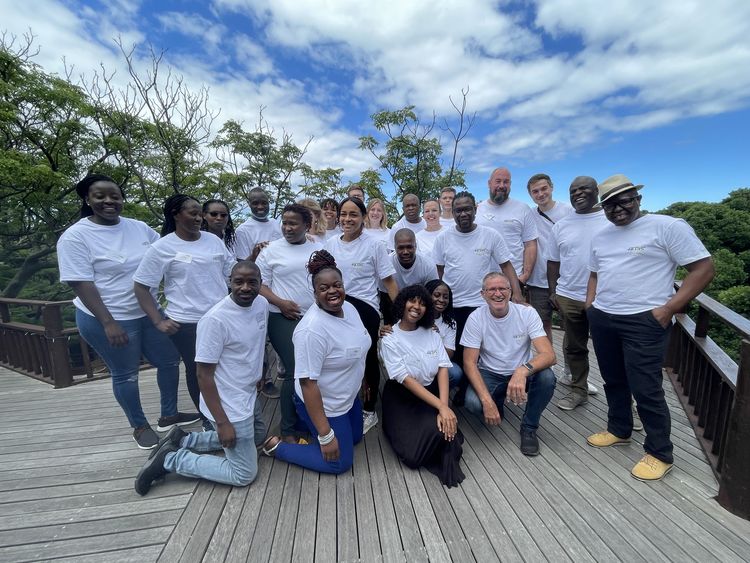
29.10.2021: Presentation the 10th DAAD South Africa Conference
At the 10th DAAD South Africa Conference, Prof. Dr. Jorge Marx Gómez presented the topic "Data Science and Big Data in support of Sustainable Development" and gave a lecture.
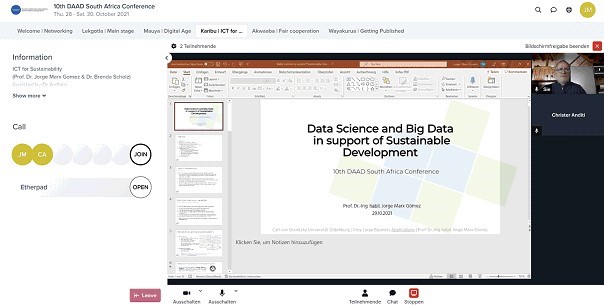
19.10.2021: International Conference on Achieving Sustainable Development
At the International Conference on Achieving Sustainable Development through Business, Innovation and Digital Technologies. (ASD2021) in Abu Dhabi, Prof. Dr. Jorge Marx Gómez gave a keynote speech entitled "Research topics in ICT for Sustainability".
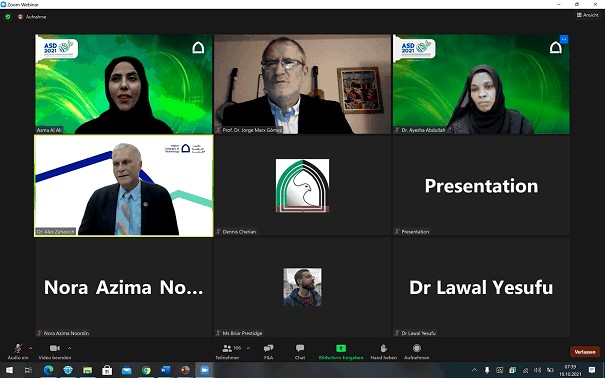
18.10.2021. VLBA presents SmartHelm and BITS results at international bicycle conference in Copenhagen
The Business Informatics Department VLBA presented latest findings of the bicycle data projects SmartHelm, which is funded for 3 years by the mFUND program, and the European project BITS (Bicycles and Intelligent Transport Systems) at the Cycling Research Board Annual Meeting (CRBAM 2021) in the Danish capital of Copenhagen. The conference, which already took place for the fifth time, discussed the latest trends in digitization and planning in the cycling domain between the 13th and 15th October 2021. The two cycling data-based projects of the Department were presented and discussed in detail in the session "Data Collection Methods" which was moderated by Jones Karlström (VTI) and Hjalmar Christiansen (TU Denmark).
In his talk "SmartHelm: Data driven study and analysis on bicycle-based logistics in delivery processing" Harish Moturu presented in detail the current studies as well as the related data collection and challenges with the helmet prototype from UVEX. The project is developing an intelligent bicycle helmet that is intended to measure distractions based on EEG and EyeTracking and to support bicycle couriers in their daily working process. The conduction of the studies by project partner University of Bremen (Cognitive Systems Lab) and the related work with the attention-related data were presented in detail. As part of the project, the VLBA implemented a data management system for handling the biophysiological helmet data and other relevant data from logistics or the bicycle sector. In order to be able to gain knowledge about distractions in real traffic, the project is planning further studies in real traffic situations, which could lead to additional interesting work and results in the data science field. Harish Moturu also referred to the mFUND funding program of the German Federal Ministry of Transport and Digital Infrastructure (BMVI) that has funded more than 300 digital innovation projects with more than 200 million Euro since 2016. The SmartHelm project has been funded by mFUND with around 1.5 million Euro since November 2019.
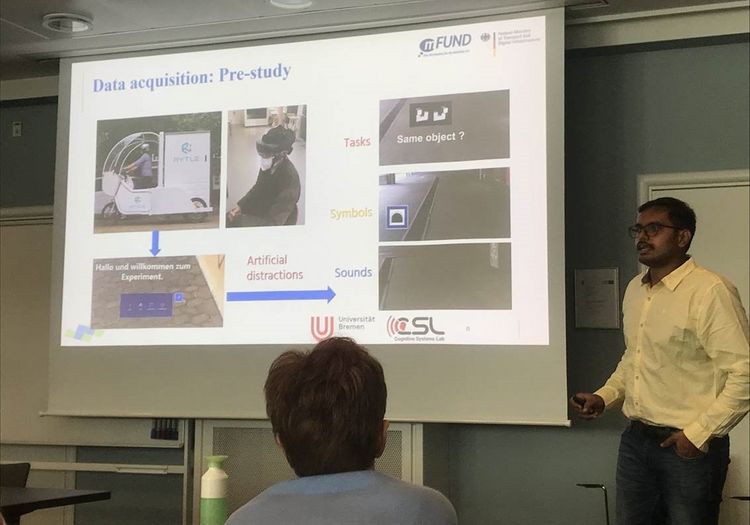 Harish Moturu presents the latest results of the SmartHelm studies.
Harish Moturu presents the latest results of the SmartHelm studies.
In the second VLBA talk entitled "BITS: Open Bicycle Data and what we can learn by it for the improvement of the bicycle infrastructure", project team member Johannes Schering presented the data collection methods in the European bicycle project BITS, which is funded by the Interreg B program until the end of 2022. A wide variety of sensor systems, such as bicycle counting stations, apps, sensors, cameras for detecting critical situations or bicycle parking are implemented and evaluated throughout the whole North Sea region. The collected data was standardized, preprocessed and published on www.bicycle-data.de as part of the Bicycle Data student project group. In particular, the website's key performance indicators (KPIs) on European cycling data enable a significantly improved comparability of different cities and applications. At the same time the new cycling KPIs give new insights in bicycle use or the traffic safety situation. The improved data availability also enables a faster expansion of bicycle traffic and the infrastructure. Johannes also discussed the applicability of the published data to the real bicycle infrastructure based on the example of an intersection in Puurs / Belgium (Province of Antwerp). The markings on the road were improved according to the results of the measurement. The detection of the near accidents were repeated in September to enable an evaluation whether the traffic situation has improved in the past two years.
Both projects were presented at a live conference for the first time in more than 1.5 years since the beginning of the Covid crisis. The extensive discussion as part of the session resulted in an exciting exchange with other European SmartCycling initiatives. Johannes Schering emphasized that the developed Bicycle Data website will be further used beyond the end of the BITS project. The long-term availability of the data sets and the KPIs will also be ensured by providing the results of SmartHelm that are going to be published and visualized at the website in the nearer future. The exchange with Heike Bunte (Free Hanseatic City of Hamburg) from the Interreg project LUCIA (Lightning in the Baltic Region) provided interesting input for the data analysis work in the SmartHelm project. As part of the upcoming work, the VLBA could consider the influence of lighting conditions on the distractions that are detected by the helmet.
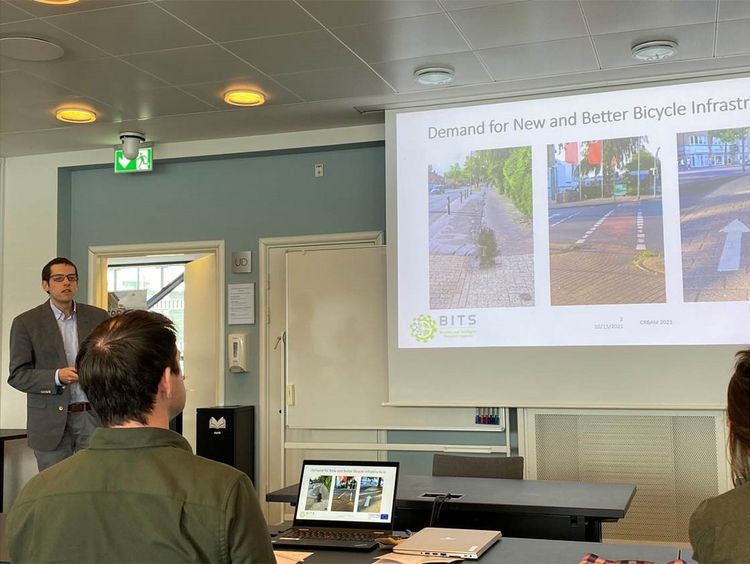 In his contribution to Cycling Research Board conference, Johannes Schering discussed the possible applications of European cycling data on the real cycling infrastructure.
In his contribution to Cycling Research Board conference, Johannes Schering discussed the possible applications of European cycling data on the real cycling infrastructure.
In this year the CRBAM was organized for the first time by the TU Denmark in Copenhagen. The overarching topic of the conference was the role of the bicycle in supporting the transformation towards a sustainable mobility system that brings together health-promoting aspects with design and functionality. The conference pursued an interdisciplinary approach: The sessions were based on the core topics of cycling safety (including cost-benefit analysis, mental health, motivation studies), behavior (e.g. from sociology, anthropology, psychology, history), data (evaluation of cycling data to facilitate planning, supporting research and quality assessment), cycling demand (including potential analysis and traffic modeling), regional planning (including studies on planning tools and strategies, effect studies). Overall, the international conference was a very good opportunity to exchange ideas with cycling experts from different sections and perspectives as professors, researchers, industrialists, urban traffic or mobility planners etc. On the first day, the contributions from various Scandinavian countries emphasized the importance of cycling research regarding a better infrastructure planning in cities, improving the quality of cycle paths, the role of policy making and the role of cycling in sustainable mobility. The second half of the first day continued with five guided bike tours to the most important cycling spots in Copenhagen, one of the most bike friendly cities in the world. The organizers used the opportunity of the bike tours to convey to the conference participants the importance of cycling in the city of Copenhagen and the infrastructure planning activities carried out in different locations. The second and third day continued with different sessions (including data collection methods) that focused on various research topics in the cycling domain. A topic that was discussed in many contributions, especially in the fields of cycling safety and data, is the Hövding airbag from Sweden which protects cyclists as an alternative to helmets in the case of an accident. The airbag is extremely popular in Scandinavia and is clearly visible in the bicycle traffic situation in Copenhagen. There is an interesting overlap with the SmartHelm approach as the data from the airbag can also be used to improve bicycle infrastructures in cities.
The Cycling Research Board conference will take place next year in Amsterdam (Netherlands) and for the first time in Germany (Wuppertal) in 2023. The exchange with other researchers in the field of SmartCycling provides important input to the VLBA cycling projects. The feedback will be incorporated into the further working steps in SmartHelm and BITS. The Business Informatics Department of the University of Oldenburg would like to thank the organizers for the excellent live event and the opportunity to exchange ideas with the European partners, which was not possible over such a long period of time.
14.10.2021: International Conference on ENTERprise Information Systems (CENTERIS) and the International Conference on Project MANagement (ProjMAN ) in Braga (Portugal)
At the International Conference on ENTERprise Information Systems (CENTERIS) and the International Conference on Project MANagement. (ProjMAN ) in Braga (Portugal) Prof. Dr. Jorge Marx Gómez gave the opening keynote entitled "Project Management in Data Science Projects - Experiences from research and industry projects".
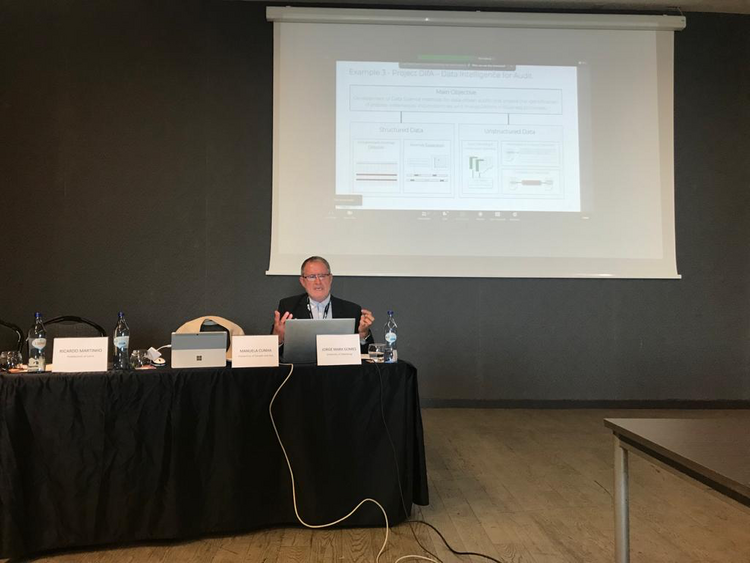
06./07.10.2021. European partners discuss about the future path of BITS
Already the 8th Steering Group Meeting as part of the European project BITS (Bicycles and Intelligent Transport Systems) took place at the 6th and 7th of October 2021. The online meeting with stakeholders from the Netherlands, Belgium, the UK, Denmark and Germany gave an overview about recently started and already planned ITS implementations for cycling and cycling data collection in the North Sea Region.
Implementations
The Province of Antwerp and the University of Oldenburg presented new ideas and efforts in the field of cycling data. As the first phase of BITS is ending at the end of 2022, the future of BITS was also discussed as part of the meeting.
The implementing partners presented new results in the testing and the evaluation of their ITS cycling solutions. For example, the Province of Antwerp repeated the measuring of near accidents (or interventions) at a critical intersection in Puurs. The goal is to learn whether the traffic safety situation has increased since the first measurement two years ago as in the meantime new markings on the road were realized. East Riding has started to supply bike sensors by provider See.Sense to citizens in the Withernsea to detect bicycle trips and surface qualities in Withernsea, and at the same time stimulate people to cycle. The city of Zwolle established a new smart lightning system and is preparing a new round of Sniffer Bike data collection to measure air qualities. The city of Oldenburg presented its plans for a new bike sharing system that is going to start service in 2022. The university of applied sciences VIVES is collecting data (countings, tracking data, questionnaires, interviews) to evaluate all the ITS implementations with respect to impact on cycling and CO2 emission reduction.
Data initiatives
The discussion about open bicycle data was part of the second day of the SG meeting. The visualization component of the CyclingDataHub is receiving an update at this moment. The University of Oldenburg, Department of Business Informatics VLBA, presented the progress of their Bicycle Data website that was recently awarded with a national prize for student projects in Germany. The KPIs of European cycling data were extended and new results about the bicycle application from Oldenburg (Baron) and the Sniffer Bike project are now online. The BITS project was presented in several academic conferences as the Living and Walking in Cities 2021 conference which was hosted by the University of Brescia, Italy. Johannes Schering of the VLBA department presented a new smart cycling project INFRASense that is starting soon in Oldenburg and that will be funded for three years by the mFUND program of the German Ministry of Transport and Digital Infrastructure (BMVI) with around 1.2 Mio. Euro. The objective is to work on a holistic data driven quality assessment of the bike infrastructure based on citizen science and planning data – a topic that fits quite well in the BITS context.
Future of BITS
The future of BITS was discussed as the final step of the two days online meeting. New ideas for a follow-up project were collected at a Miro board as part of an interactive session were all partners had the opportunity to contribute. The idea is to submit a follow-up BITS project in the new Interreg NSR programme (2021-2027), but also to expand BITS beyond the borders of the North Sea Region with new implementations and partners to make this smart cycling initiative even more visible all across Europe.
The next Steering Group Meeting of the BITS project is planned for March 2022 and can hopefully be conducted as a live event in Oldenburg.
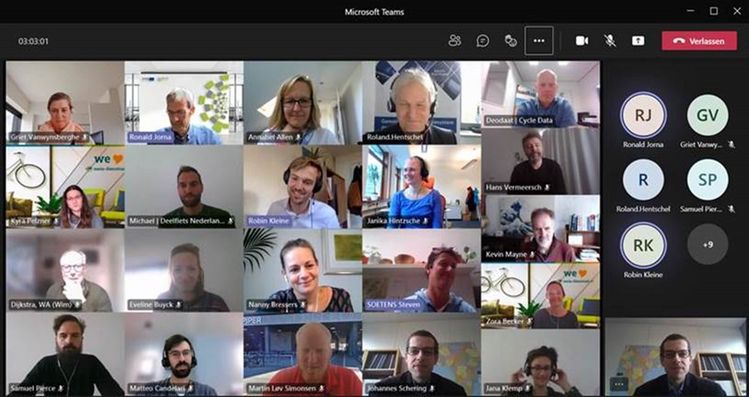
The interdisciplinary project team from five different European countries met online to discuss the further working steps and the future of BITS.
30.09.2021: Project HAPTIK at the Mittelstandstag Schleswig-Holstein
As part of the Mittelstandstag Schleswig-Holstein Hauke Precht was able to Present the project HAPTIK.
The attendance event was held at the Wunderino Business Lounge in Kiel.
Our presentation and our partake in a little booth was enabled and supported by the Forum Digitale Technologien.
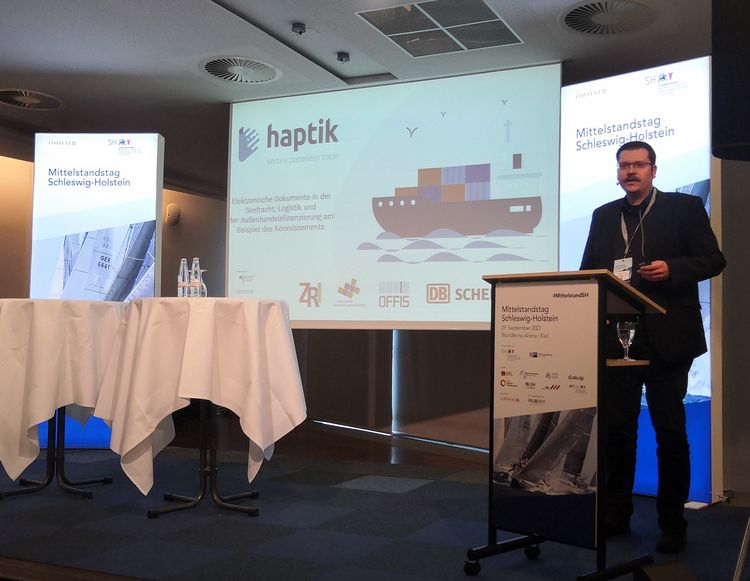
29.09.2021: Online Research Fair of the DAAD Centers of African Excellence
The Online Research Fair of the DAAD Centers of African Excellence (past and future research for inclusive and sustainable development in the DAAD's African Centers of Excellence) took place from September 28-29, 2021.
As part of the Research Fair, Prof. Jorge Marx Gómez represented the CENIT@ EA (Center of Excellence on ICT for East Africa) project and gave a lecture entitled "Research topics in ICT for Sustainability".
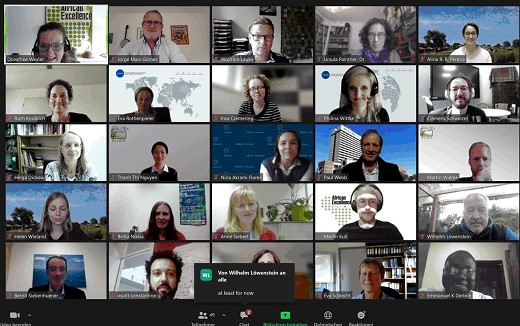
28.09.2021: Bicycle Data wins national student prize in Germany
The Bicycle Data student project of the VLBA Department of the University of Oldenburg was a big success – also regarding its contribution to the promotion of cycling and the relating solution of environmental problems in European cities. This is also reflected by the ranking of the Environmental Informatics Prize 2021 for students: In competition with other data driven student projects from Germany, Bicycle Data has won the 3rd prize. The master student team is rewarded with 400€ for its great performance during the period of two semesters in 2020/2021. Professor Hans Knud Arndt of the Otto von Guericke University, Magdeburg, highlighted the importance of the winning projects for the further promotion of sustainability as part of the digital award presentation ceremony.
The Environmental Informatics Prize 2021 is awarded for students’ works in the field of environmental informatics as part of the Enviroinfo 2021 conference (informatik2021.gi.de/enviroinfo-2021). Such work takes the form of projects undertaken either as part of a course or for a degree (excluding PhD) at an academic University or a University of Applied Sciences. The projects demonstrates the contribution of methods and technologies of informatics to the solution of environmental problems or dissemination of information supporting sustainable development in general. The jury consists of the heads of the International Technical Committee “Informatics for Environmental Protection, Sustainable Development and Risk Management” of the German Informatics Society (GI, www.gi.de/).
Sponsors of the year 2021 are Adesso SE, Dortmund, Germany (www.adesso.de), ecco ecology + communication Unternehmensberatung GmbH, Oldenburg, Germany (www.ecco.de), worldiety GmbH, Oldenburg, Germany (www.worldiety.de), einfach.effizient. Treuhand Unternehmensberatung GmbH & Co. KG, Oldenburg, Germany (www.treuhand.de) and OFFIS e.V., Oldenburg, Germany (www.offis.de).
The VLBA department and the BITS project send their best congratulations to the Bicycle Data project team that has done a really good job.
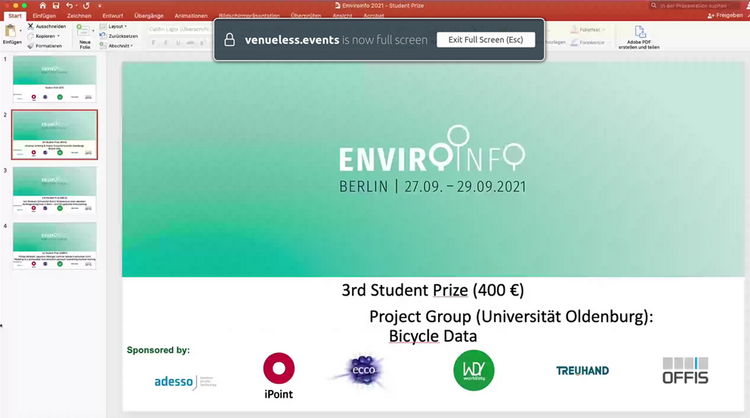
28.09.2021: 11th BUIS Days (Operational Environmental Information Systems) took place in the context of the GI Annual Conference 2021
The workshop event 11th EMIS-Days (Environmental Management Information Systems) took place on April 17th with in the GI-Annual Meeting 2021.
The workshop was organized by the technical committee Environmental Informatics, section Environmental Management Information System within German Informatics Society (GI) and the Center of Environmental and Sustainability Research (COAST) at Oldenburg University (Germany). With a total of 17 contributions in the sessions BUIS Applications & Energy, BUIS Platforms & Algorithms, BUIS in Teaching and Sustainable Mobility, the event was very well attended.
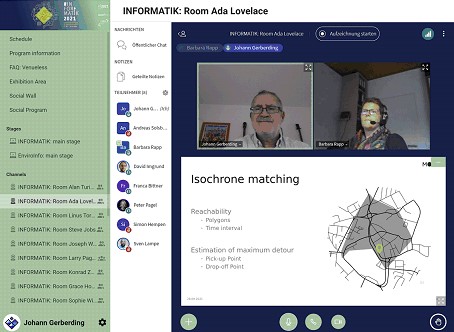
27.09.2021: Oldenburgisch-Ostfriesischer Wasserverband (Water Board for Oldenburg and East Frisia, OOWV) and Oldenburg University Teaming up for Another Research Cooperation
A research cooperation between OOWV and Oldenburg University (Business Informatics – VLBA) has been triggered on September 27th under the acronym “MigHANA”.
The research project will run in parallel to the implementation of SAP SE’s HANA-based suite of products with OOWV. Its objective is to identify and evaluate opportunities and limitations of these new applications. Innovative, scientifically challenging, and usable prototypes for the utility industry will be developed based on this foundation.
The merger of OLTP and OLAP in SAP HANA embodies a paradigm change, as organizations are now able to move away from reporting as a “one-way street” and towards partially autonomous, closed-loop management control systems. This gives rise to new scientific questions affecting the design of enterprise architectures. Over two years, the research cooperation MigHANA will deal with topics covered by OOWV’s SAP S/4HANA roadmap, mainly focusing on the development of flexible data, information, and control architectures, designed to support transactional and analytical applications in the realms of data science and data analytics.
Because of the natural and inevitable heterogeneity of administrative, water management-, and sustainability-related business requirements within a utility, a key challenge for the research cooperation is conceiving innovative concepts not as insular solutions but instead seeing them as building blocks which are embedded into an wholistic, decisions- and management-oriented (enterprise) architecture.
Contact: Prof. Dr. Jorge Marx Gómez, E-Mail:
Michael Mattern, E-Mail:
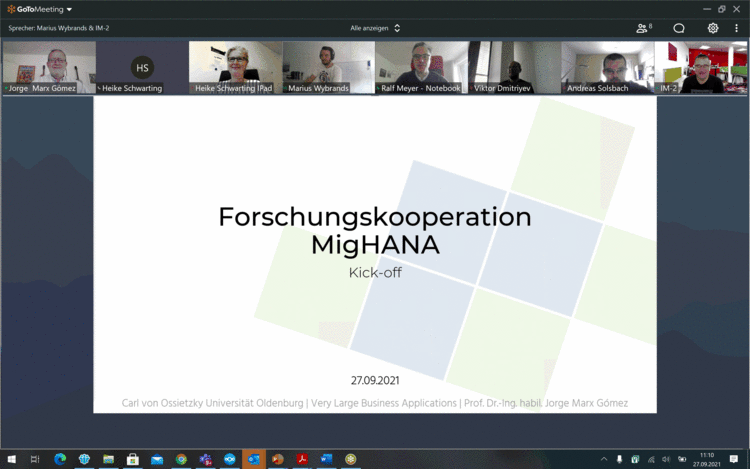
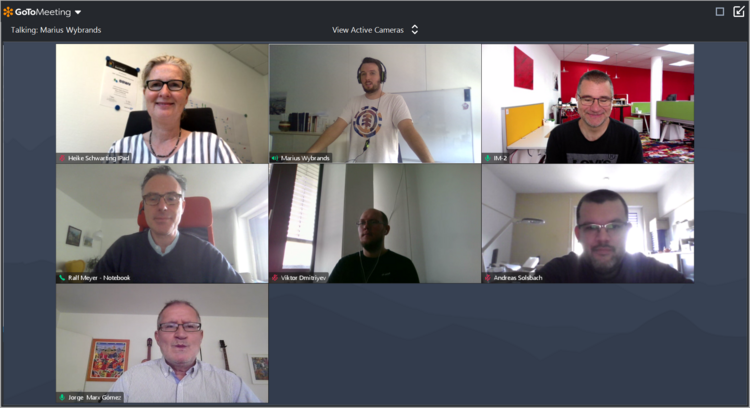
[1] Plattner, H. (2009, June). A common database approach for OLTP and OLAP using an in-memory column database. In Proceedings of the 2009 ACM SIGMOD International Conference on Management of data (pp. 1-2).
[2] Mangisengi, O., & Huynh, N. T. (2008). Towards a Closed-Loop Business Intelligence Framework. In ICEIS (1) (pp. 210-217).
21.09.2021: Project HAPTIK at the networking meeting of the Smarte Datenwirtschaft
As part of the first attendance event since the start of the Corona pandemic, the HAPTIK project took part in the networking meeting of the Smarte Datenwirtschaft funding line in Berlin on 21 and 22 September 2021.
The project was presented to other projects of the funding line with a poster at the so-called World Café on the first day of the event.
On the second day of the event, Dr. iur. David Saive and Hauke Precht presented keynote speeches in two workshops, presenting experiences from the project period to date on the impact on the industry and on dealing with regulatory obstacles and the legal framework.
Furthermore, there was an exchange with other projects of the funding line in the context of a bar camp and various topics were developed.
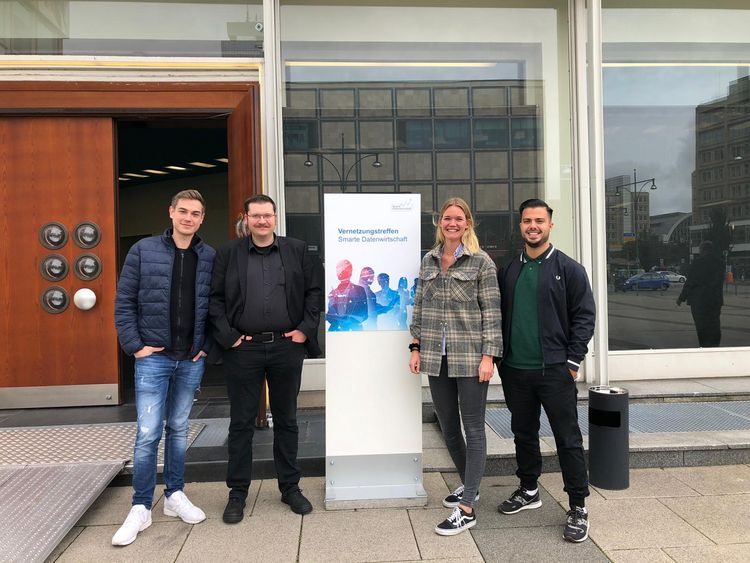
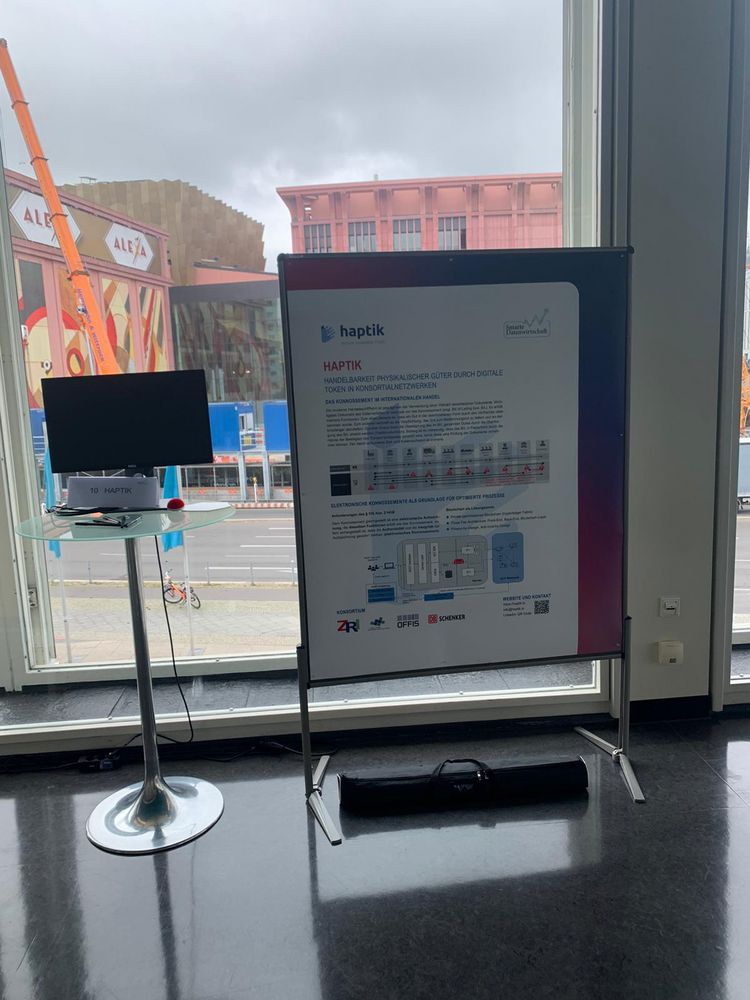
17.09.2021: Presentation of the results of the Data Challenge 2021
On 17.09.2021 the results of this year's Data Challenge were presented. In front of an audience of employees of the VLBA, the practice partner abat AG and other invited guests, four student groups presented their results achieved in the last two weeks. Different approaches for data-based risk forecasting for transports and deliveries were developed and vividly presented. The VLBA congratulates all students on their creative results!
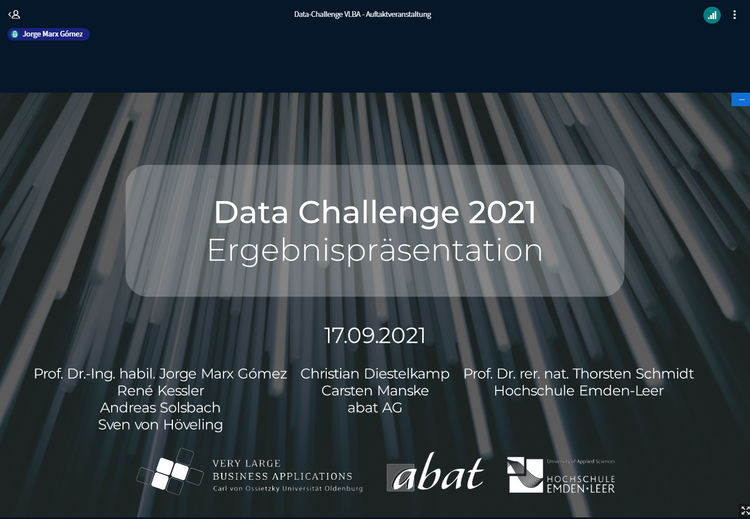
15.09.2021: The end of the TRACE research project after 3.5 years of operation
The TRACE research project, which was carried out in cooperation with Volkswagen AG, ended on September 15, 2021 after a 3.5-year period. In the context of a final presentation, the gained insights were presented to interested audience members of the VLBA and Volkswagen. Fortunately, there will be a 6-month follow-up of the project to operationalize the developed prototype.
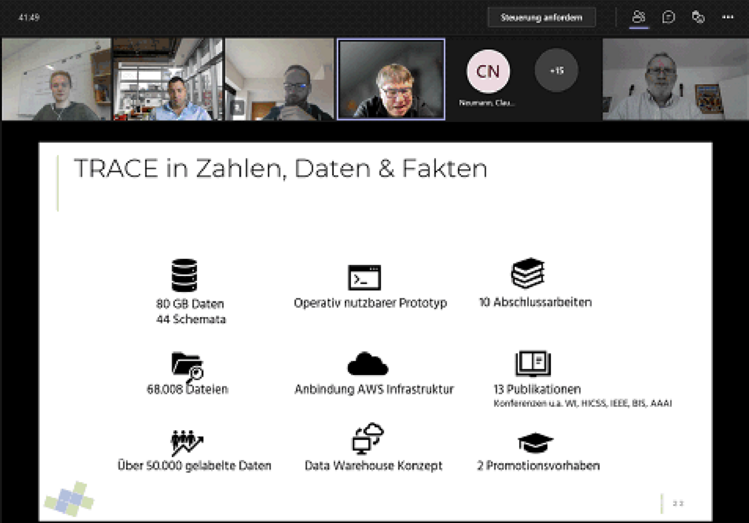
14.09.2021: VLBA presents research results about cycling data at international conference
The actually running BITS project (Bicycles and Intelligent Transport Systems) was recently presented at the Living and Walking in Cities LWC Conference in Italy. In his talk research associate Johannes Schering (University of Oldenburg, Department of Business Informatics VLBA) emphasized the importance of bicycle data for the further uptake of cycling in European cities. In the presentation of his research paper “The BITS Project – Making cycling data available and comparable on a European scale” Johannes presented new cycling Key Performance Indicators (KPIs) to make different cites comparable as part of the website Bicycle Data that is provided by the VLBA department.
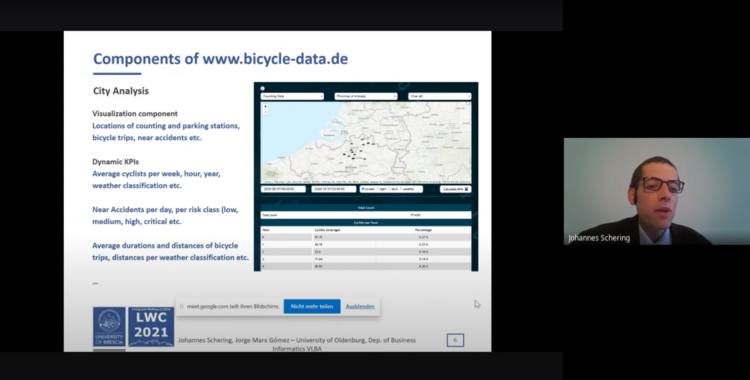 Johannes Schering presented new cycling KPIs to make cities and regions comparable (Source: LWC 2021).
Johannes Schering presented new cycling KPIs to make cities and regions comparable (Source: LWC 2021).
As part of the discussion in the interdisciplinary and international panel it became clear that the harmonization process of European cycling data is a huge challenge. There is no standardization regarding data structures or how to collect data what makes different regions hardly comparable. The research paper was presented as part of the session “Big Data, ITS, and MaaS” which was moderated by Benedetto Barabino (University of Brescia).
The LWC International Conference which was organized as a hybrid event as consequence of the pandemic traditionally deals with the topics of urban mobility and quality of life in urban areas, with a specific focus on vulnerable road users as pedestrians and cyclists. The LWC Conference allows researchers, experts, administrators, and practitioners to gather and discuss about policy issues, best practices, and research findings from different perspectives. In total, more than 220 authors from 21 countries contributed to the LWC conference. We are expressing our thanks to the organizers to present the BITS project and our research results.
Further information about the Living and Walking in Cities Conference can be found here:
lwc.unibs.it/
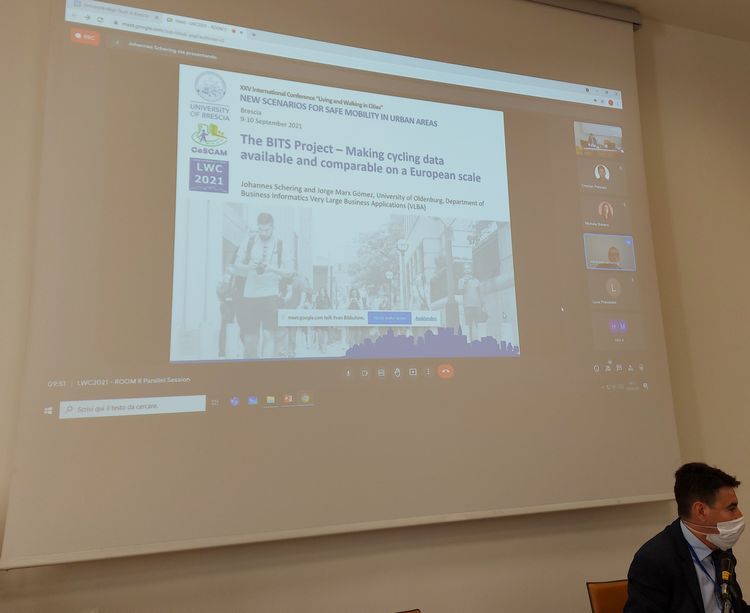 The international Living and Walking in Cities conference 2021 was organized as hybrid event with participants in presence and online (Source: LWC 2021).
The international Living and Walking in Cities conference 2021 was organized as hybrid event with participants in presence and online (Source: LWC 2021).
07.09.2021: The first part of a series of workshops from the joint project “Wärmewende Nordwest”
On September 7th, 2021 the first part of a series of workshops to develop possible business models took place as part of the joint project Wärmewende Nordwest (Heat turn north west). Antonieta Alcorta de Bronstein and Jantje Halberstadt from the University of Vechta guided the members of the project partners worldiety, Detlef Coldewey GmbH and the Univerity of Oldenburg through the Problem Statement Canvas method.
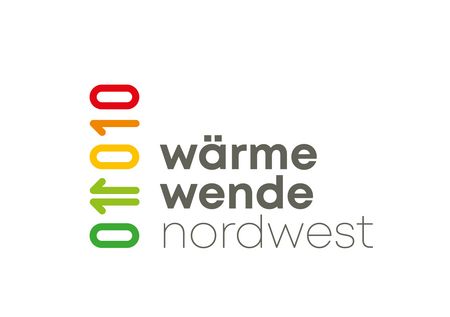
06.09.2021: Kickoff meeting for the research cooperation between AMCON Software GmbH and Oldenburg University (Business Informatics - VLBA)
The kickoff meeting for the research cooperation between AMCON Software GmbH and Oldenburg University (Business Informatics - VLBA) took place on Monday, September 6, 2021.
The aim of the research cooperation is to solve planning problems and use potential for optimization in the area of on-demand traffic by applying AI methods.
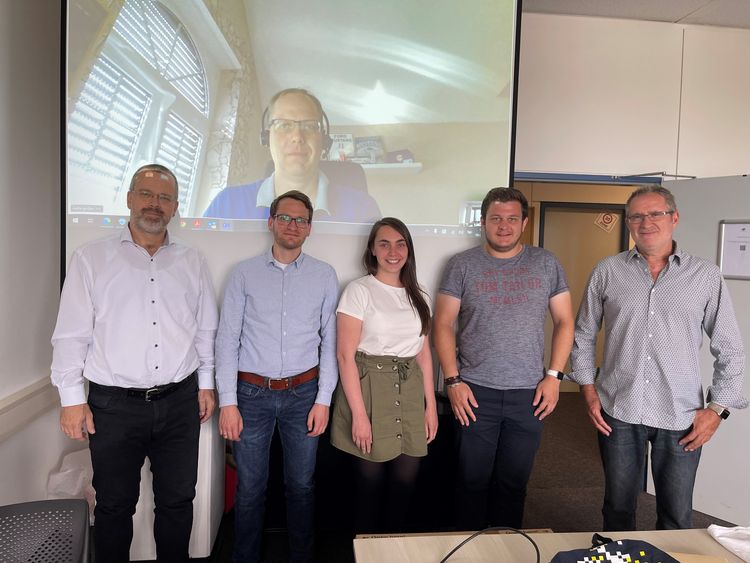
29.07.2021: Academic kicks off for project dskills@EA – CENIT@EA
On July 29 the academic consortium of dskills@EA - CENIT@EA came together for a virtual kick-off meeting. The successor project to CENIT@EA was launched in July 2021 and expands the successful activities surrounding the Centre of Excellence for ICT in East Africa.
The goal of the dskills@EA-CENIT-CENIT@EA project is to further strengthen teaching and research in the field of embedded and mobile systems in East Africa: by continuing the master's degree program in Embedded and Mobile Systems (EMoS) established in the previous project phase, by qualifying young people for the ICT job market, and by strengthening innovation and entrepreneurship in East Africa. At the academic kick-off meeting representatives from University of Oldenburg, from the Nelson Mandela African Institution of Science and Technology (NM-AIST) in Arusha, Tanzania, where the master program is located and from sponsor DAAD discussed the next steps of the project. University and Oldenburg together build the academic consortium of the project.
The goal of the dskills@EA-CENIT-CENIT@EA project is to further strengthen teaching and research in the field of embedded and mobile systems in East Africa: by continuing the master's degree program in Embedded and Mobile Systems (EMoS) established in the previous project phase, by qualifying young people for the ICT job market, and by strengthening innovation and entrepreneurship in East Africa. At the academic kick-off meeting representatives from University of Oldenburg, from the Nelson Mandela African Institution of Science and Technology (NM-AIST) in Arusha, Tanzania, where the master program is located and from sponsor DAAD discussed the next steps of the project. University and Oldenburg together build the academic consortium of the project.
Consolidation and next steps
In the dskills@EA - CENIT@EA project some elements of the first project phase are deepened, while other elements are newly added. The established curriculum of the Embedded and Mobile Systems (EMoS) master's degree program will be expanded and re-accredited. Systematic quality management ensures the quality of teaching in the program, and close cooperation with partners from industry strengthens its practical relevance. New additions during the dskills@EA-CENIT@EA project will include a career service unit, alumni work and a didactic center.
Right now, the academic partners are looking forwards to the applications of the 4th cohort of students for the EMoS programme as the call has been opened in July 2021 together with the call for scholarship applications. The cohort will begin their studies in January 2022. The first cohort of students is currently finishing their studies and will officially graduate in August with a formal ceremony.
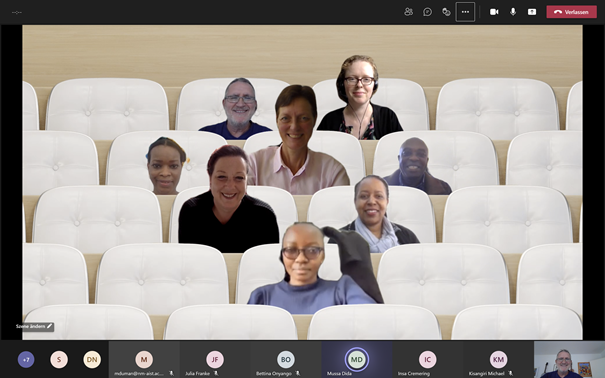
Implementation partners of the Higher Education Center are the German Academic Exchange Service (DAAD) and the Inter-University Council of East Africa (IUCEA). Project sponsor is the Gesellschaft für Internationale Zusammenarbeit (GIZ) on behalf of the German Federal Ministry for Economic Cooperation and Development (BMZ). You can find a comprehensive list of all associated partners here (LINK: uol.de/vlba/projekte/dskillsea-cenitea)
27.07.2021: Joint Steering Committee of CENIT@EA heralds follow-up project
On July 27, 2021, the Joint Steering Committee of the Centre of Excellence for ICT in East Africa (CENIT@EA), for which VLBA is co-responsible, held a hybrid meeting and set the course for the second project in the series, dskills@EA-CENIT@EA, which was launched in July. Some members attended the meeting together on site in Arusha, Tanzania, while the majority of members joined virtually from Oldenburg, Bonn, Kampala and Kigali. On the agenda was the status of the joint project at the start of the second project phase and the next steps to expand the centre. For example, as part of the project, the third cohort of students has already started the jointly established master's program Embedded and Mobile Systems (EMoS) at the Nelson Mandela African Institute of Science and Technology (NM-AIST) at the beginning of 2021, which will be followed by the fourth and final cohort in January 2022. The center also offers various trainings and advanced trainings for practice-oriented digital skills and extensive support for business start-ups and innovations. In the follow-up project dskills@EA-CENIT@EA, the focus is now on deepening and expanding these offerings and anchoring them in the region in the long term.
CENIT@EA is a regional centre for the East African community, meaning the countries of Kenya, Uganda, Tanzania, Rwanda, Burundi and South Sudan with particularly close links to the economy. The Joint Steering Committee of the project is correspondingly set-up. In addition to the University of Oldenburg and the Nelson Mandela African Institute of Science and Technology (NM-AIST) as the academic consortium and the DAAD and GIZ as the project executing agencies, the committee also includes the East African Community (EAC) Secretariat, the Inter-University Council for East Africa (IUCEA), the East African Science and Technology Commission (EASTECO), the East African Business Council (EABC) and the East African Business Community (EACO). The committee usually meets twice a year.
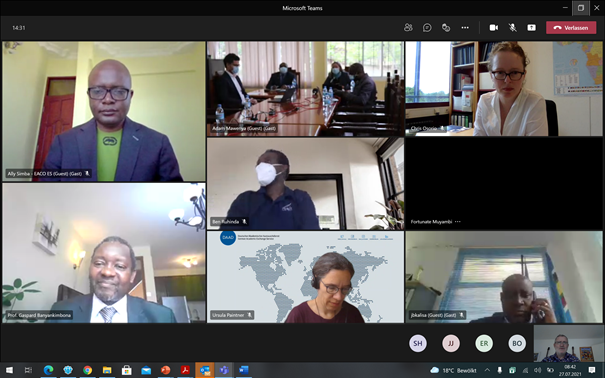
15.07.2021: Data meets Science event series launched at CORE Oldenburg
On July 15, 2021, the first event of the new format Data meets Science took place. On the topic "With drones & AI to automated inventory", 35 participants from business, science and the community met at CORE Oldenburg to discuss Data Science and the use of Artificial Intelligence. The event was organized by the Innovative Hochschule Jade-Oldenburg project, the peak lab and CORE.
Jens Läkamp, managing director of the peak lab, welcomed the participants to the Meetup and introduced the coworking space CORE, where the event took place. Afterwards, René Kessler (Department of Business Informatics, University of Oldenburg) presented the results of a research cooperation between the University of Oldenburg and abat AG with his keynote speech "Automation of inventory through the use of drones & computer vision". As part of the project, the inventory process of a beverage warehouse is being optimized to completely eliminate manual counts. Subsequently, further partial aspects of the project were discussed in detail during the question and answer session. Finally, the participants were able to take part in a guided tour of CORE or directly join the open networking.
The event series Data meets Science will be continued from September. The meetings are always dedicated to current topics around Data Science and look at them from the perspective of research and applied science in companies in the region. The central focus is on exchanging ideas with each other and gaining new inspiration. If you would like to be informed about upcoming dates or would like to contribute a topic yourself, please contact Malte Schulz and Timo Kasselmann at .
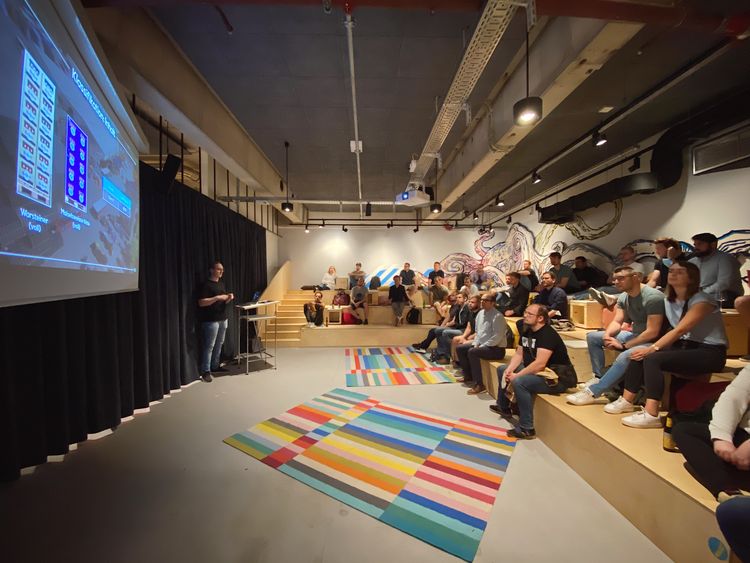
15.07.2021: SmartHelm discusses with citizens the potential of intelligent bicycle helmets for bicycle logistics
The SmartHelm project aims at the development of an attention-sensitive bicycle helmet, which should support employees in inner-city bicycle logistics in their working process. In order to bring this rather futuristic topic closer to the interested public, the project partners answered questions of citizens in an interactive panel discussion. The hybrid event under the title “Cargo bike logistics 2.0 - project SmartHelm” was conducted both physically on site at the local Oldenburg television channel O1 in combination with digitally connected speakers and citizens.
In their short presentations, the SmartHelm experts discussed the current development status of the project which is funded by the mFUND program of the Federal Ministry of Transport and Digital Infrastructure BMVI since November 2019. Project coordinator Dr. Kristian Schopka (RYTLE GmbH) and Sebastian Pust (CITIPOST Nordwest) highlighted the potential of bicycle logistics for cities and the relevance of the intelligent bike helmet in this context. Dr. Stefan Baumgart (TeamViewer) and Urban Plangger (UVEX), who were both connected digitally to the discussion round, explained the technical perspectives of the helmet in an understandable way. On the one hand, the presentation focused on the application potentials of smart glasses and examples of visualizations in the display while driving and in the delivery process. On the other hand, UVEX informed about the helmet development in detail - the integration of the data glasses and the EEG electrodes for measuring the awareness levels presented particular challenges.
In addition to the practical perspective, the participating universities also presented the research aspects in the SmartHelm project. Professor Tanja Schultz from the Cognitive Systems Lab (University of Bremen) outlined the particular challenges in the previous data collection, which so far limited to internal tests at the University campus in Bremen. The number and position of the electrodes, which can slip out of position when cycling, play a key role in the comfort when wearing a helmet. People with very short hair are in principle less suitable for the EEG measurement. Since different people react differently to distractions, many different participants in the studies are also required in order to be able to achieve meaningful findings. On behalf of Prof. Jorge Marx Gómez, Johannes Schering from the Department of Business Informatics VLBA (University of Oldenburg) introduced the potential of the SmartHelmet data for improving bicycle logistics and the bicycle infrastructure. The VLBA has developed a data management platform in the project and will evaluate the data from the studies with regard to distraction factors. The results could, for example, be applied to the bicycle infrastructure in Oldenburg in order to improve road safety at problem areas, for example at intersections or main roads.
In the discussion, which was moderated by Jürgen Boese, the citizens had the opportunity to ask questions about the SmartHelmet. Many new ideas for the development of a possible SmartHelm 2.0 were collected at this point. For example, personalized speech recognition could prevent manipulation by non-participants as pedestrians in the city. In addition, it should be possible to enter temporary road closures or other obstructions by the voice integrated voice control so that other cargo bike riders can receive appropriate information. Other topics as theft protection, monitoring of the bicycle infrastructure and employees rights were also discussed intensively. As a survey among the participants showed, many residents of the city of Oldenburg receive regular parcel deliveries, but this has not happened very often by cargo bike delivery. That means that there will be many new applications for cargo bikes and intelligent helmets in the inner city delivery process in the future. The research project is planning to test the SmartHelm from August 2021 during the parcel delivery of project partner CITIPOST Nordwest in real road traffic in Oldenburg in order to be able to better assess the potential and application possibilities of the helmet in logistics.
SmartHelm would like to thank the interested citizens for the fruitful input and the O1 television channel, the Oldenburg energy cluster OLEC, which made the event online accessible to the citizens via Zoom as a video conference, as well as the City of Oldenburg for organizing the interactive format. The recording of the SmartHelm citizen science event can be watched on YouTube.
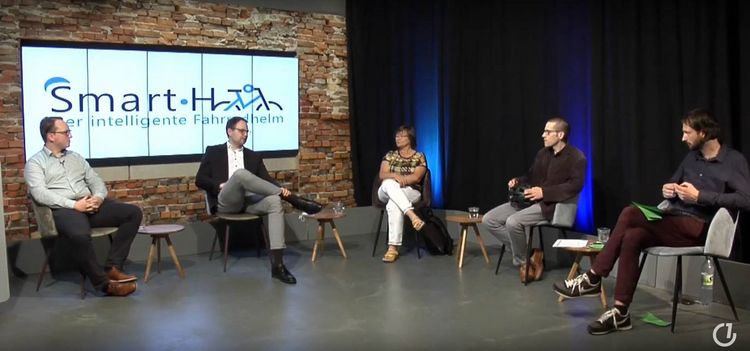 In the interactive panel discussion, the experts from Oldenburg and Bremen answered questions from citizens regarding the potential of an intelligent helmet for bicycle logistics. Source: O1 (YouTube).
In the interactive panel discussion, the experts from Oldenburg and Bremen answered questions from citizens regarding the potential of an intelligent helmet for bicycle logistics. Source: O1 (YouTube).
14.07.2021: FREE für MORALE – Training of Trainers
In the scope of the Erasmus+ Project MORALE - Capacity Building for Curricula Modernization of Syria and Lebanese HEIs and Lifelong Learning Provisions: Towards Sustainable NGO Management and Operation with Special Focus on Refugees, VLBA organized a Training of Trainers Module from the 13th to 15th of July.
Academic staff from Syrian and Lebanese Universities, as well as NGO Employees from the region received training in the scope of Soft Skills. The training materials were specifically designed for the region and covered the topics Critical Thinking, Unconcious Bias, Leadership, Time Management und Public Speaking.
The training materials, which followed a self-learning approach, were developed within the VLBA Erasmus+ Project FREE- Female Academic Role Model Empowerment, Equality and Sustainability at Universities in Mediterranean Region: Toward 2030 Agenda.
This way, the training series connected both Erasmus+ Projects and forms a starting point for fruitful future cooperation in the areas of Female Empowerment and Sustainable NGO Management in Syria, Lebanon and Jordan.
For further information please consult the project websites:
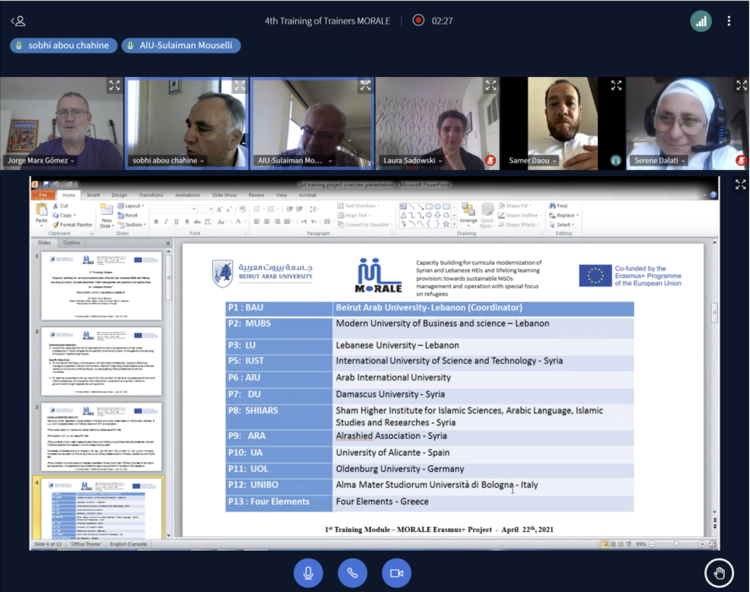
28.06.2021: Workshop: Digitization of agriculture and rural areas
Based on the research projects DigiSchwein (Cross Innovation and Digitization of pig farms) and NEMo (Sustainable satisfaction of mobility demands in rural regions) Oldenburg University (Prof. Dr. Jorge Marx Gómez, Business Informatics) organized a workshop (held on 25th June 2021) discussing the topics: implementation in practice, further solution approaches, from prototypical implementations to real business models, technical further developments and decision support. Participants were representatives from political, research and industry.
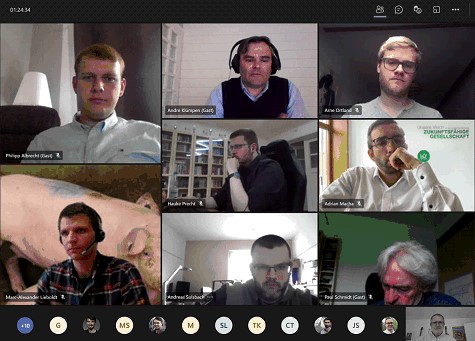
15.06.2021: Virtual tour at the InnovationCampus
The InnovationCampus is the second location of the IHJO-project. Interested representatives of regional companies and institutions, start-ups and university members can get support on issues related to the transfer of ideas, knowledge and technology. In addition to workshops and networking events, the campus offers rooms and modern infrastructure to develop digital and mechanical prototypes.
On June 15, a virtual tour of the campus-based metal workshop and digital lab took place as part of the nationwide Digital Day. During the event, participants received an overview of the prototyping possibilities at the site and were able to exchange ideas with the staff of the subprojects.
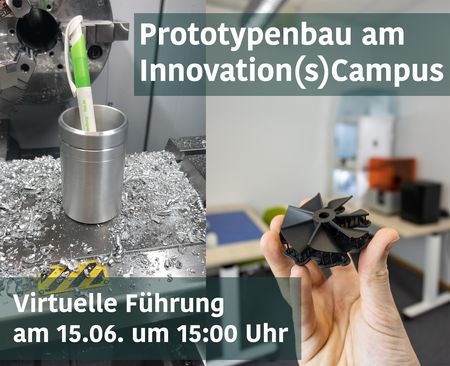
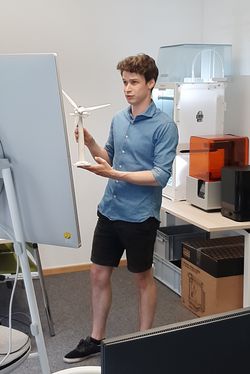
Further information on the InnovationCampus and the InnovationLab digital can be found at ihjo.de/innovationscampus/.
Contact:
Timo Kasselmann
InnovationLab digital
Tel: +49 (0)441 798-4426
E-Mail: timo.kasselmann@uni-oldenburg.de
04.06.2021: Disputation of Ammar Alsous
On June 4th, 2021, Dipl.-Inf. Ammar Alsous successfully defended his dissertation with the title "QoS-Aware Backup Model for Cloud SDN Using Feedforward Neural Networks". The Department of Information Systems VLBA and the OFFIS institute congratulate him.
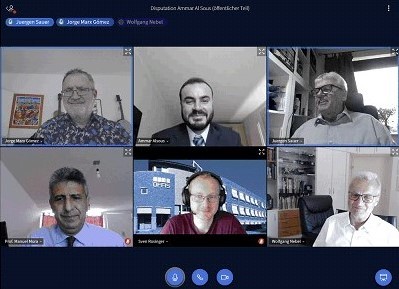
03.06.2021: The International Virtual Workshop on Business Analytics, Eureka 2021
In the frame of the conference "The International Virtual Workshop on Business Analytics, Eureka 2021" Prof. Dr. Jorge Marx Gómez gave a keynote presentation entitled "Implication of Machine Learning on Data Management in Companies".
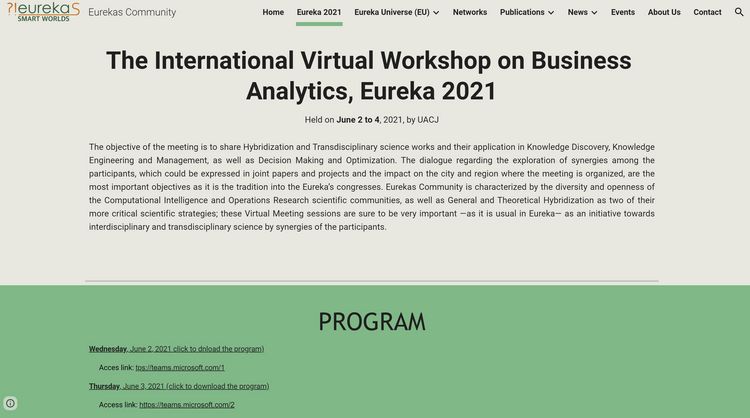
Further information about the eureka network and the conference is given under:
www.eurekascommunity.org.
01.06.2021: BITS project publishes bicycle data from European cities
The partners of the interdisciplinary BITS project - Bicycles and Intelligent Transport Systems - recently met up digitally to discuss about the next working steps. As part of the 7th Steering Group Meeting, the European regions and Baron Mobility from Oldenburg presented their current running or planned activities on smart cycling applications. Among these, the province of Antwerp will repeat the detection of critical situations (near accidents) at a dangerous intersection based on an intelligent 3D camera system in autumn in order to assess whether cycling safety has improved on site. In September 2019, first experiences with this measurement technology were gained at an intersection in Puurs in the provincial area. The related results of the data analysis of the VLBA student project group Bicycle Data can be found at www.bicycle-data.de.
The CyclingDataHub (CDH), a European portal for open bicycle data and the key deliverable of the BITS project, was officially launched in April. Already 135 data sets were shared by internal and external stakeholders and are open available to the general public. In this context, suitable formats and metadata were also discussed intensively as part of the internal meeting. The VLBA is currently working on the further development of the Bicycle Data website, which will provide a lot of European bicycle data sets to the CDH, and on the improvement of the included Key Performance Indicators (KPIs) on bicycle use and cycling safety in European cities.
Another discussion topic was the question of whether and how the internal project meetings could be conducted at least partially in presence again in the future. The next project meeting could be conducted in Oldenburg in October 2021 as a hybrid event, what means that participation both in presence and via video online call could be possible, if the further course of the pandemic permits that.
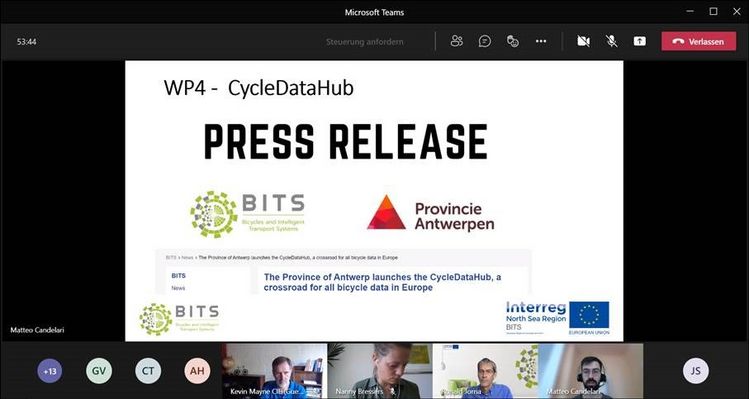 The CyclingDataHub was a central point of discussion of the BITS Steering Group Meeting.
The CyclingDataHub was a central point of discussion of the BITS Steering Group Meeting.
18.05.2021: Successful implementation of the company workshop
On 18.05.2021 the company workshop was successfully carried out.The PUUK portal is a demand-oriented environmental information portal, on which citizens of municipalities as well as companies can view collected environmental information. Its development takes place in the context of the PUUK project (www.puuk-projekt.de), which was initiated by the working group "Sustainable Environmental Policy and Digital Change" of the eighth government commission of Lower Saxony and is demanded by the DBU. In the company workshop 19 participants took part, in order to talk together with the PUUK team about the supply of environmental information and to create new improvements, processes with the environmental portal PUUK.
The workshop lasted 90 min in total and included two topics.
- Provision of information - status quo
- New approaches with PUUK
Within these topics, different issues were discussed. In summary, the discussion was intended to examine existing solutions so that they can be further built upon, and to discuss new ideas and processes together so that new functionalities could be derived from the workshop.
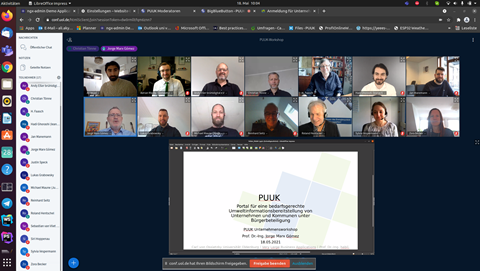
22.04.2021: NEMo discusses the potential of mobility platforms for rural areas in digital citizen participation format
A strong focus of the NEMo research project was on the question of how citizens can resolve mobility supply bottlenecks in rural areas and become mobility providers by themselves. In order to maintain the dialogue with the public in this context, the Schlaues Haus Oldenburg recently organized an online-based discussion evening under the topic “What contribution can mobility platforms make to improving mobility?”. In addition to the presentation of the central results of NEMo, the general public had the opportunity to discuss future development scenarios for mobility with the interdisciplinary and transdisciplinary research project. In their talk, Prof. Dr.-Ing. Jorge Marx Gómez and project team member Johannes Schering made very clear the relevance of mobility platforms in rural areas. In particular at the county side, people face enormous challenges when they try to organize their daily lifes without their private car, since the availability of public transport is very limited, especially at off-peak times at night or the weekends. The NEMo mobility platform that has been developed combines various mobility options that not only considers the preferences of the users, but also private mobility offers. In further research approaches, however, the research team thinks beyond the improvement of mobility: In NEMo 2.0, community building and the attractiveness of rural areas in various dimensions, such as shopping, learning, working, relaxation and leisure, should be improved by the possibilities of digitization.
In the interactive panel discussion which was moderated by Dr. Jan-Jonathan Bock from the Research & Transfer Department of the University of Oldenburg, many of the queries from citizens were directed towards the future of mobility. It was intensively discussed whether automated vehicles could in future play a role in ride-sharing options in rural areas in order to increase the range of available ride-sharing solutions. In particular, the achievement of a critical mass and the integration of other mobility platforms that have so far been regionally oriented play a central role in improving the acceptance and real applicability of mobility platforms. A transfer of the solution developed in NEMo to the Hatten area in the Oldenburg district is currently in preparation, as Mayor Dr. Christian Pundt from the municipality of Hatten announced.
In the research project NEMo, the potential of ride sharing along rural areas was comprehensively examined. Social science surveys have shown that the dependency on private cars is significantly greater in the village than in densely populated areas. However, the surveys carried out in the Wesermarsch district also showed that picking private people up in your private car can in principle have many advantages for everyone involved and is viewed positively. A multimodal travel assistant, such as the developed Fahrkreis-App, can make an important contribution to bringing together those who are potentially interested in taking a ride. For a promising implementation, the app must be adapted to local conditions (e.g. the mobility options available on site).
The Smart House Oldenburg is dedicated to the dialogue between science and society and offers insights into the research of the University of Oldenburg and the Jade University. The Smart House sees itself as an interface between people from the city and region, science and business. The aim is to bring science closer to the citizens in an understandable way. Research topics are conveyed in an exciting way in lectures, panel discussions, readings and exhibitions. The science center is located in Oldenburg City, close to the historic Oldenburg Castle, directly at the Schloßplatz. Until face-to-face events are possible again, the dialogue in pandemic times will be maintained at least in the context of interactive online formats.
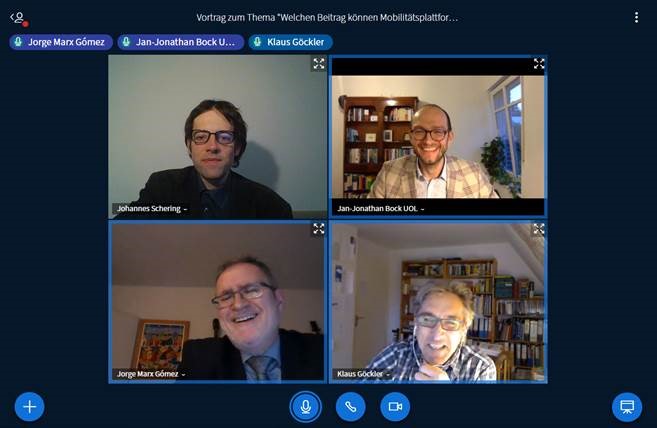
Interested citizens had the opportunity to interact with NEMo as part of the online discussion (Big Blue Button).
22.04.2021: Artificial Intelligence - Opportunities for Financial Administration
On 22.04.2021, an information event on the topic of "Artificial Intelligence in Tax Administration" took place, at which Prof. Dr. Marx Gómez, together with Mr. Andre Klümpen, the Head of Unit at the Lower Saxony State Tax Office, explained in more detail the opportunities and challenges of AI in tax administration. In addition, the project "Tax Defence Analytics" (TaDeA) was briefly presented and first experiences from the project were shared. In addition to Prof. Gómez and Mr. Klümpen, Prof. Dr. Oliver Thomas, Head of the Department of Information Management and Business Informatics at the University of Osnabrück, was invited as a speaker.
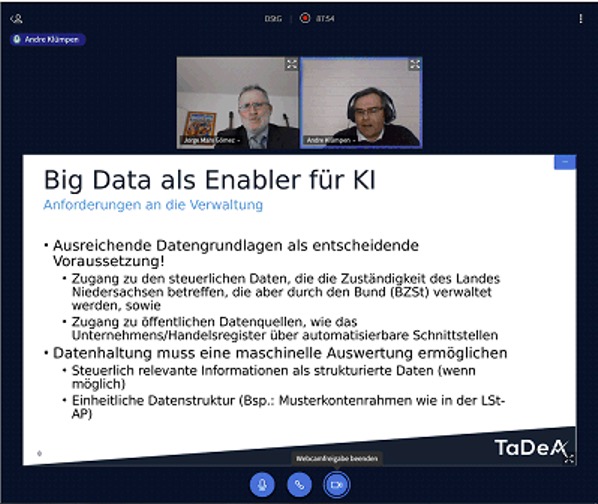
15.04.2021: VLBA student team presents results on European open bicycle data
The student project group Bicycle Data recently presented its final results on the analysis of European cycling data to the interested public. The almost two and a half hour digital event was embedded in a BITS Academy, which took place as part of the EU-funded project BITS - Bicycles and Intelligent Transport Systems. Almost 200 participants from all over Europe had the opportunity to learn more about the potential of the preprocessed cycling data sets as well as to contribute interactively and give feedback to the project. For a duration of one a year, the students worked intensively with bicycle data of the research projects BITS and SmartHelm, which is funded by the mFUND program of the German Ministry of Transport and Digital Infrastructure (BMVI). The results of the developed project website www.bicycle-data.de were presented in detail.
In their introduction, Kevin Mayne (Cycling Industries Europe) and Johannes Schering (VLBA, standing in for Prof. Dr.-Ing. Jorge Marx Gómez, head of the department) pointed out very clearly the potential of cycling in Corona times and the relevance of the availability of relating bicycle data for cities and regions. The SmartHelm part of the presentation presented first results of the Cognitive Systems Lab of the University of Bremen as part of a current running augmented reality study that is partly conducted during cycling. Urban Plangger of project partner of UVEX SPORTS presented live a first prototype of the attention-sensitive smart helmet, which is supposed to support bicycle couriers during their working process by an EEG measurement, EyeTracking and digital glasses (AR display of the Microsoft Hololens2). The students themselves dealt intensively with the EEG data collected by the helmet. Using various machine learning approaches, it was investigated whether distractions can be identified and types of distractions can be determined on the basis of initial laboratory study data provided by the University of Bremen. For this purpose, various artificial neuronal networks were trained, as presented by Thilo von Glan, Marwin Kröger and Marvin Büchel of the project group.
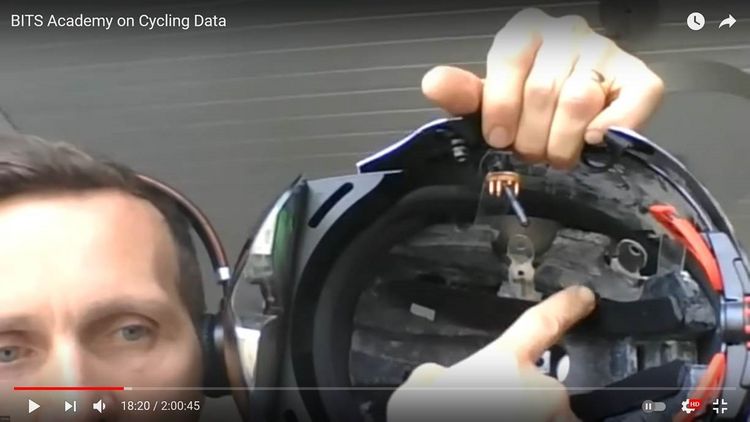
Urban Plangger (UVEX) presents the first prototype of the smart bicycle helmet (Youtube).
For further development of the website and the related improvement of the user orientation, the feedback of potential future users, especially from municipalities, traffic planners or software developers, is very desirable. Therefore, the final presentation did not just consist of Power Point presentations, the participants were also able to actively contribute their ideas. In this context, the audience was asked in a poll 1.) which information should ideally be visualized on the AR display of the helmet's glasses, 2.) which potential data sources could be used for the visualization and 3.) in which other application scenarios besides city logistics the intelligent helmet could potentially be used. The feedback was obtained based on an interactive Miro board which allows the participants to contribute their specific ideas. From the participants point of view the focus was particularly on traffic safety: For example, accident or critical points in the infrastructure, the distances when taking over by motorized traffic, information on the condition of the road or the stress level of the rider could be displayed. Navigation suggestions, weather information or points of interest for recreational cyclists could also be displayed. For bicycle commuters, information on train stations or bicycle parking facilities could be made available, while citizens could be given the opportunity to report dangerous road spots or problems in the infrastructure.
The second big part of the presentation focused on the processing, harmonization and publication of European cycling data on the Bicycle Data website as part of the BITS project. Anselm Fehnker, Franziska Ernst and Dennis Schulte discussed the challenges of data harmonization. The work of the student team showed very clearly that bicycle data is collected and published in many different ways differing country by country and city by city (e.g. by bicycle counting stations or apps). The missing common understanding of how to collect cycling data makes it very difficult to compare different cities. In order to be able to find correlations between different data sets, an extensive data preprocessing was necessary. The Bicycle Data website also provides new Key Performance Indicators (KPIs), graphs and visualizations on bicycle use (e.g. apps, sensors, bicycle parking) or road safety (near accidents) in Europe. To enable all interested parties to use the processed data sets for further purposes as traffic planning or software applications, these can be downloaded as open data on the website. The functions of the Bicycle Data website were presented in detail as part of a live demonstration by Jan Stüven, Simon Czapski, Tugba Dalmaz and René Rohde. The KPIs and the other functions of the website need to be evaluated by practitioners and adjusted accordingly to their demands. Accordingly, the topics of bicycle counting, tracking / sensor data, traffic safety (near accidents) and the technical background in the development of the website were discussed intensively in four break-out sessions. Various potentials for further technical developments and improvements were identified with the participants.
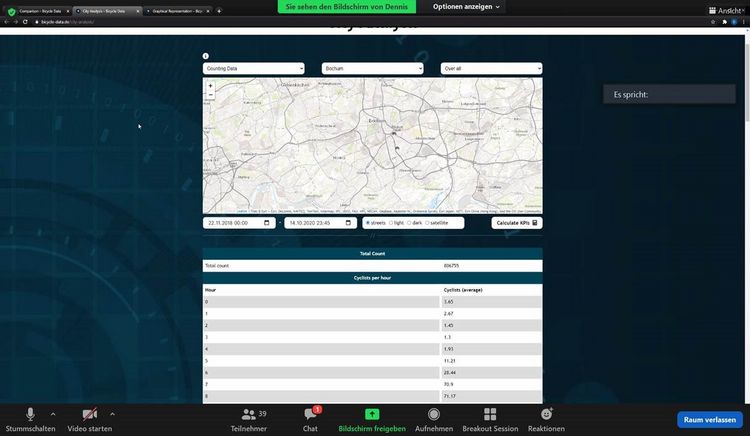
As part of the interactive break out sessions the results of the data team, here the bicycle counting data, were discussed with external stakeholders (Zoom).
A central goal of the BITS project is to make European bicycle data available. For this purpose, the BITS project as a whole is working on an European open data portal with special focus on cycling data, the so called CyclingDataHub (CDH). The BITS Academy was therefore rounded off with a live demonstration of the Hub which is based on ArcGis by Kim Verbeeck from the Province of Antwerp in Belgium. Similar to the mCLOUD of the BMVI, external cycling data sets of other external websites can be linked to the CDH. Interested stakeholders as from municipalities, transport planning, business, research or other interested parts of the society will be enabled to publish their cycling data as open data sets. A corresponding call for data provision was recently published on the official cycling portal of the BMVI in Germany, which you can find here.
The Bicycle Data project group is very pleased about the huge interest in their successful work on European bicycle data. The project team consists of eleven masters students from the academic field of (Business) Informatics. The huge data base which was built up as part of the project provides a strong fundament for further data-based work in the research projects BITS and SmartHelm. The recording of the digital BITS Academy can be watched afterwards at Youtube. The project team gives thanks to all external participants and stakeholders, the project partners for their active contributions and Cycling Industries Europe (CIE) for organizing and hosting the event.
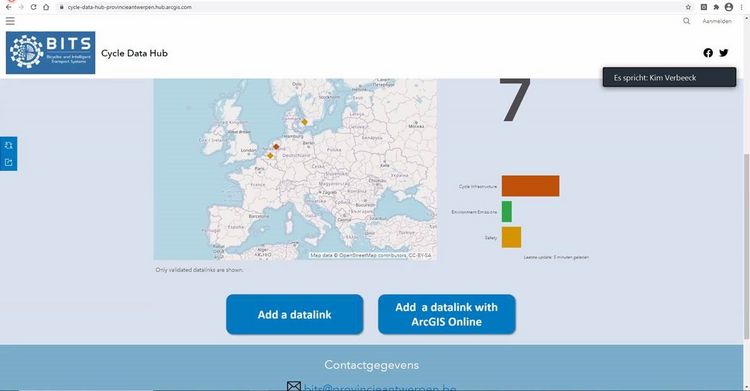
As part of the official launch of the CyclingDataHub (CDH) all interested stakeholders are requested to publish their existing bicycle data sets as open data (Province of Antwerp).
01.04.2021: Kickoff of the starting PG "INDICATE"
On April 1, 2021, the kickoff of the PG "INDICATE", which will start in this summer semester 2021, took place as an online meeting. Besides getting to know all participants, the main focus was on defining the first project steps and topics. The students will spend a year dealing with the topics of maintenance strategies, predictive maintenance and digital twins. The goal is to improve the maintenance of the water infrastructure on the island of Langeoog with the help of a digital twin.
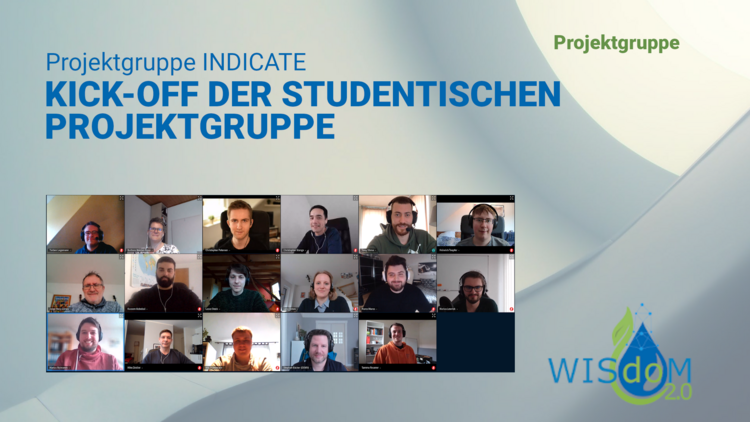
31.03.2021: Invitation BITS Academy Bicycle Data Event University of Oldenburg 9th of April
Dear Sir or Madam,
in April we will host a digital BITS Academy on the subject of European bicycle data at the University of Oldenburg as part of the EU funded BITS project - we would like to invite you to this event.
With the website www.bicycle-data.de the student project Bicycle Data has built up a very large database of bicycle data (e.g. bicycle counting data, sensor data, apps, near-accidents, bicycle parking, smart helmets).
There will be a live demonstration of the website for analysis, visualization, comparison (Key Performance Indicators on European cycling data) and for downloading the open bike data (not all functions of the website are already online, the official launch will take place as part of the event).
The presentation will be embedded in a BITS Academy which is part of the EU project BITS Bicycles and Intelligent Transport Systems.
Other concepts on the digitalization of cycling, e.g. the intelligent bicycle helmet SmartHelm that assists bicycle couriers during the working process, will be presented.
In order to be able to discuss the topics directly with you and the other participants, there will also be several break-out sessions.
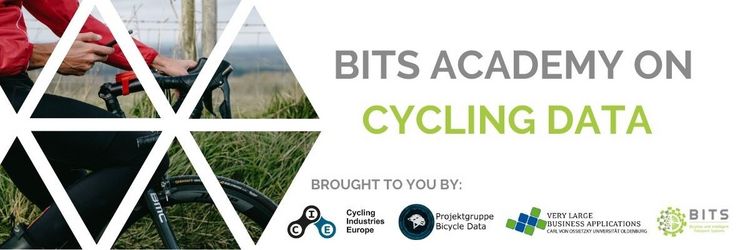
You can take a look to the agenda under the following link:
northsearegion.eu/bits/events/bits-academy-on-cycling-data/
Date: Friday, 9th of April, 2 pm to 4.30 pm.
We would be happy to hear from you as whether you are going to attend to the event.
You can register below.
Please forward the invitation to colleagues or other interested parties. We would be very pleased about your participation.
Please register under the following link:
www.eventbrite.co.uk/e/bits-academy-on-cycling-data-registration-147442609815
26.03.2021: Successful realization of the YEEES research conference 2021
From 24.03. - 26. 03 took place under the title:
"RESILIENCE THROUGH SUSTAINABLE ENTREPRENEURSHIP, DIGITAL SOLUTIONS AND EDUCATION.
A German-African Digital Conference" the YEEES research conference took place.
More than 200 people from all continents participated in the conference. Keynote speaker was Alan Knott-Craig, who gave a presentation about his experiences as an entrepreneur and answered questions from the audience afterwards. In summary, the YEEES Research Conference was a great success.
We would like to thank all participants and the project partners.
The conference was dedicated to Anna Spiegler, who unfortunately left us much too early.
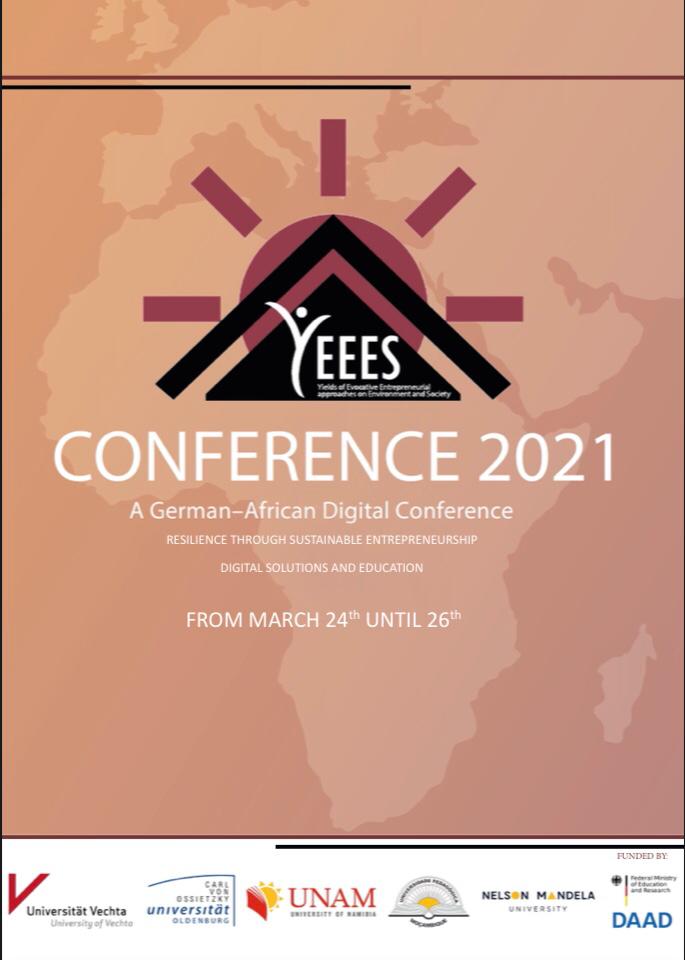
17.03.2021: VLBA receives HMD Best Paper Award
Every year, the HMD Best Paper Award honors the three best contributions of an HMD year. This year, René Kessler and Jorge Marx Gómez are among the winners with the publication "Implication of Machine Learning on Data Management in Companies".
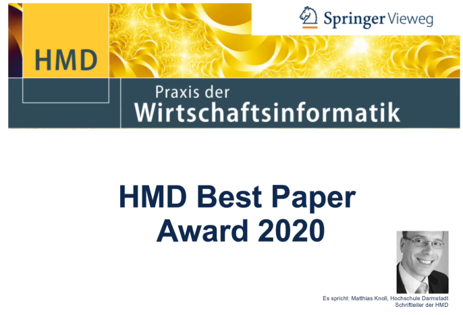
The award was presented at the virtually oriented WI 2021 by the editors of HMD.
Link to the publication (open access): link.springer.com/article/10.1365/s40702-020-00585-
16.03.2021: YEEES Conference 2021: Resilience through Sustainable Entrepreneurship, Digital Solutions and Education from 24 to 26 March
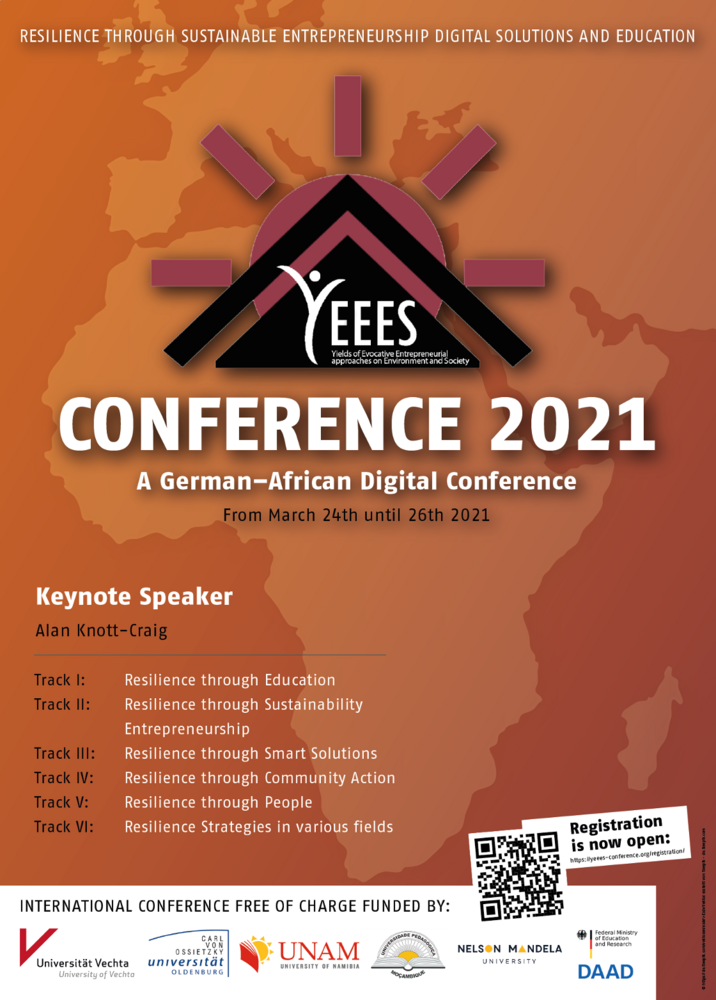
Our research focuses on the combination of entrepreneurship, sustainability and ICT cumulated in the question: “How can sustainability entrepreneurship based on or using ICT in the fields of urban agriculture and mobility contribute to resilient city development in Africa?” With the aim of finding questions to these research perpectives, interesting and innovative scientific contributions have been made within the framework of YEEES. These were submitted via various channels initiated by YEEES: as a master’s thesis from our master scholarship holders, doctoral theses (still to be completed) also in the course of a scholarship or various scientific articles from scientists belonging to our project.
For detailed information about the conference and the project, visit:
yeees-conference.org/#conference
04.03.2021: VLBA students present Bicycle Data Dashboard to European partners
As part of the Interreg project BITS (Bicycles and Intelligent Transport Systems), the sixth internal project meeting (Steering Group Meeting) took place at the beginning of March. The student project group Bicycle Data presented their recently developed Bicycle Data Dashboard to the public for the first time. As part of a live demo, René Rohde, Simon Czapski and Jan Stüven showed the various potential applications of cycling data. The newly developed dashboard consists of the three core components visualization, Key Performance Indicators (KPIs) and the option to download the raw data from a wide variety of SmartCycling implementations. Data sets of bicycle counting stations, bicycle sensors, apps, near-accidents and bicycle parking from the Netherlands, Belgium, the UK and Germany are available. In addition to the visualizations, the European partners took a very interested look to the KPIs as part of the live demonstration: These enable e.g. a better comparison of the amount of cyclists in different European countries and regions. The KPIs will be evaluated in the forthcoming months by the participating European municipalities. The rich cycling data base that the student team has built up and processed in one year time could also be part of the CyclingDataHub, the open portal for bicycle traffic data, which is being developed by the province of Antwerp in the BITS project, in the nearer future. The student project group Bicycle Data is pleased about the positive feedback by external partners. Further details will be presented on the 9th of April, from 2 p.m., as part of the online-based final presentation. In addition to the knowledge gathered from the BITS project, the students will also present their work in the SmartHelm project and the related attention-relevant EEG and EyeTracking data of the helmet. If you are interested to participate in the final presentation please contact Johannes Schering ().
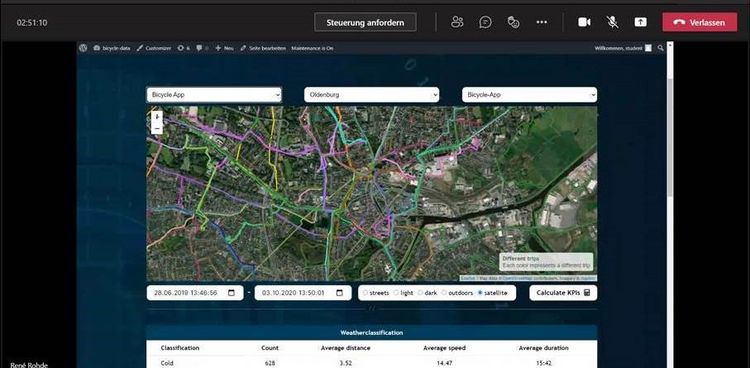
As part of the Live Demonstration the VLBA students presented various visualizations of European cycling data at the BITS meeting.
03.03.2021: Conference of the Interreg Project BLING
On the 3rd of March in 2021 at 10am, the Interreg Project BLING held its online Mid-Term conference on blockchain, project progress and use cases. Over 100 people registered for the event. The university of Oldenburg were excited to participate as well and presented two blockchain based use-caseses related to the projects BLING and HAPTIK. Please find the details of the event, in the link below:
northsearegion.eu/bling/news/much-awaited-and-highly-attended-the-bling-mid-term-conference/
15.02.2021: Citizen participation in science: Virtual discussion series "On the move" starts with event on sustainable mobility in Oldenburg and surrounding areas
On February 15, 2021, the first event of the Innovation(s)Labor digital on the topic of citizen participation in science took place with the kick-off event "On the move - sustainable mobility in Oldenburg and surrounding areas". The event is a cooperation between the project Innovative Hochschule Jade-Oldenburg (IHJO), the Schlaues Haus Oldenburg and the city of Oldenburg's project Civic Data Lab. More than 100 participants gathered in the virtual event room.
The event examined aspects of sustainable mobility from various perspectives. Management consultant and activist Katja Diehl opened the discussion from a societal perspective and reflected on current mobility behavior in the region. Dr. Norbert Korallus, Head of Transport Planning at the City of Oldenburg, then presented the city's activities and goals and reported from the perspective of local authorities. Prof. Dr.-Ing. habil. Jorge Marx Gómez, Professor of Business Informatics at the Carl von Ossietzky University of Oldenburg, motivated the participants to influence the mobility landscape by participating in research projects and presented the NEMo and EcoSense projects. Finally, Lukas Schneider, Business Area Mobility at EWE Go GmbH, presented the company's activities and goals and gave insights into the existing e-sharing product.
In a concluding discussion, the questions of the participating citizens were addressed and the speakers exchanged their ideas on the future of mobility. The participants thus received inspiring insights from different perspectives and were able to contribute their views and experiences and help shape the discussion. Further information and references for the event can be found at: ihjo.de/auf_achse/.
If you are interested in similar or upcoming events or in the project in general, please contact Malte Schulz or Timo Kasselmann from Innovation(s)Labor digital ().
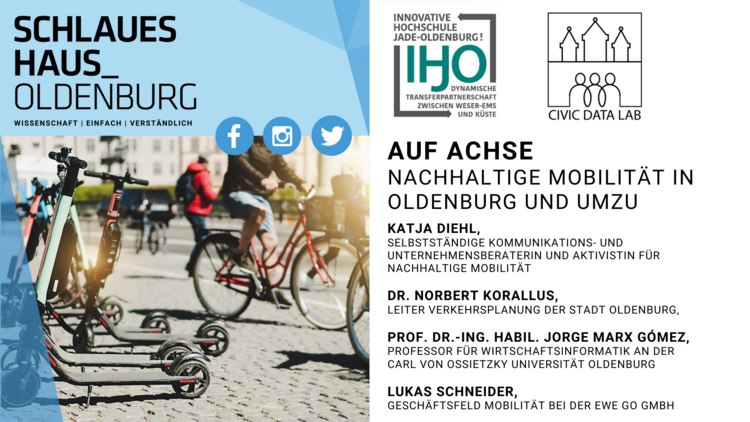
02.02.2021: Kick-off WISdoM 2.0
On 02.02.2021 the kick-off meeting for the research cooperation WISdoM 2.0, a cooperation between the Department of Information Systems/VLBA at the Carl von Ossietzky University Oldenburg and the Oldenburgisch-Ostfriesischer Wasserverband, was successfully held.
In the first part of the kick-off, there was a review of the past two years of the first research cooperation and a lessons learned. With the learnings and a discussion, the presentation of the second research cooperation, which will run until the end of 2023, started.
With the kick-off, the first phase of the research cooperation has been successfully completed and the starting signal for the second phase has been given. We are all highly motivated and look forward to three years of exciting collaborative research and a fruitful exchange of knowledge.
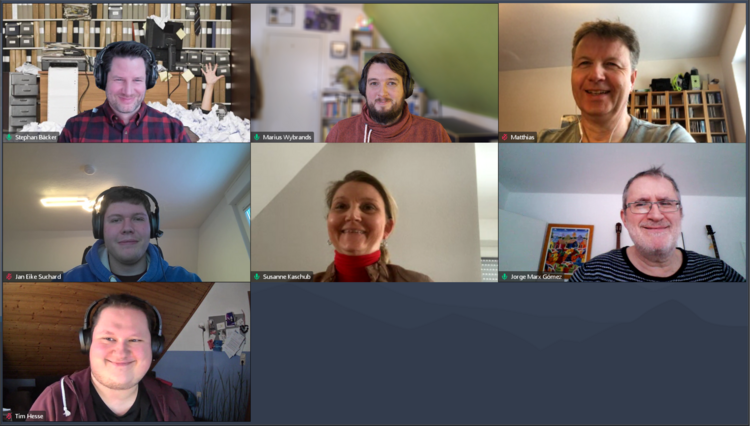
27.01.2021: Official video of the DigiPig experimental field
The BMEL has published an official video on the DigiPig experimental field, which can be found at the following link. The film briefly summarizes the motivation, problems and goals of the experimental field and describes the current challenges of digitization in modern pig farming. The DigiPig experimental field is one of 14 projects in the field of agriculture funded by the BMEL.
An overview of all funded projects can be found on the following website.
12.01.2021: Results of Workshops #1 - Citizen Needs
In addition to the evaluation of our survey, we at the PUUK project have completed the evaluation of our first workshop on citizen needs. In order for you to get an idea of the results, you will find a summary of what citizens have developed in cooperation with our facilitators down below.
We, the PUUK team, would like to once again thank all participants for their excellent cooperation!
Topic Citizen Participation in Environmental Information Portals
Citizens are well aware of their ability to measure environmental data, and their interest in such participation is not only present, but growing.
However, the amount of all the different, measurable data points poses a challenge. Which of these data points would be useful for which institution or organization?
How is the data to be collected? Would this be possible passively? What equipment is needed to measure correctly? How and to what agency should the data be forwarded? These are the primary questions raised in the workshop.
However, there was also interest in what benefits such participation would bring to the citizen itself.
In order to establish a good cooperation with citizens within the PUUK project, the primary focus should be building trust in the planned platform.
In addition to transparency and accessibility, citizens also long for secure handling of the collected and presented data.
It is hoped that incorporating these whishes will increase the trust to a point at which the platform would not only promote the responsibility of the individual, but its data would also exert influence on decision-makers.
One possible challenge for citizen participation, however, could be environmental laws, which are sometimes perceived as confusing.
Topic Requirements for Environmental Information Presentation
As of now, citizens have gained experience with environmental information representations via portals on regional as well as state level, and through specialized portals. The usage of maps and color coding with corresponding legends as well as widgets, which are procided by associated apps, seems common for the representation of environmental data. A special incentive to engage with this data arises in particular when the displayed data has been collected in the immediate proximity.
In the context of the development of an environmental information portal, the primary wish is to contextualize the measured data by providing further information on sources as well as explanations and comparative limit values.
Considering the last point, the desire for clarification regarding the effects on humans also found resonance.
In addition to detailed information offers, the personalization of the presentation appeared to be of high importance to the citizens. The user should be able to compile this information freely, with the option of choosing from simple to detailed views as well as being able to define aspects such as color codings themselves. It is important, however, that such individualized views do not restrict access to existing information.
All of this is to be realized via a portal that can preferably be accessed via an app.
The citizens contributet just as many ideas for implementation. In addition to simple summaries and recommendations for action, contextualization should also be possible through comparisons with previous data sets.
For representations such as maps and icons (also for e.g. recommendations for action), elements of a simple nature should be used, which can be deepened into further detailed views if required.
In order to make it easy to access all the data, the idea of exporting data in different formats was put forward.
Topic Mobility and Environmental Information
Citizens associate mobility in particular with its environmental impacts, such as emissions of CO2, NOX and particulate matter.
Cehicles and transport-oriented apps (e.g., car sharing) however, also offer the possibility of recording environmental information on mobility. One wish of the citizens would be to use this approach to record, for example, the utilization of the road network or local environmental pollution.
However, the majority of the wishes were primarily related to the political dimension. In addition to better park-and-ride connections, expansion of the infrastructure for cyclists and e-scooters, and more precise information on the travel times of public transportation, a rethinking of new mobility concepts was called for.
In addition to free public transportation and bicycles, citizens identified the construction of bicycle expressways, increased parking costs, the MOIA concept and subsidies for climate-friendly mobility approaches as possible solutions.
The expansion of barrier-free services was also well received.
Other wishes included an environmental information portal in public hands that would enable private providers of, for example, car-sharing services to feed in their collected data.
Such a portal should also provide incentives for more climate-friendly behavior. One example would be to show alternatives to the automobile and the resulting savings in emissions or calories burned.
Since incentives for climate-friendly behavior should reach all citizens, it should be borne in mind that such an environmental information portal should appeal to all age groups.
Topic Environmental Information provided by Municipalities
Citizens primarily want information from local authorities on a whole range of environmental data. Drinking water quality, air, noise and light pollution, soil and water contamination, radioactivity and greenhouse gases were among the topics discussed.
In addition, the state of flora and fauna and, in particular, the issue of energy consumption seemed to be a major concern.
But it is not only the status quo that is of interest. Citizens are also interested in how it can be improved for the better. In this respect, information about measures taken by local authorities is another wish.
Another topic was the form in which information from local authorities should be presented to citizens. What was desired here was the contextualization of up to date values by means of descriptions and developments over time.
These should also show which trends are emerging as a result of measures taken, in order to be able to evaluate them better.
Of great interest is also the role of the individual, to what extent he or she is affected by any environtmental burdens, but also what opportunities are available to him or her to exert a positive influence.
Citizens do not want to receive all this information via newsletters. Instead, their access should be individualized and interactive. Interaction should not be limited to the presentation of the data provided though.
Instead, citizens would like to have the opportunity to contribute their own data.
12.01.2021: Results of the survey from the PUUK project
Over the course of the new year, we at the PUUK project set out to complete the evaluation of our survey on user groups and desired focal points of environmental information portals.
The results include the responses of 505 people who took part in the survey between August 2020 and mid-January 2021. The results can be downloaded as a PDF file via the button below.
The results of the survey are available here.
The PUUK project team would like to take this opportunity to once again thank all participants for their great cooperation and insightful feedback!
07.01.2021: "Wärmewende Nordwest" collaborative project in the VLBA
As part of the joint project “Wärmewende Nordwest: Digitalisierung zur Umsetzung von Wärmewende- und Mehrwertanwendungen für Gebäude, Campus, Quartiere und Kommunen im Nordwesten“, the Department of Business Informatics / Very Large Business Applications (VLBA) at Carl von Ossietzky University Oldenburg, headed by Prof. Dr.-Ing. Jorge Marx Gómez, is responsible for the research field "Regional Online Platform for Energy Efficiency Optimizations and Business Models" (ROPE) together with the partners Detlef Coldewey GmbH and worldiety GmbH. The project, which is funded by the German Federal Ministry of Education and Research from the end of 2020 until 2025, will deal with the development of an innovative digital platform for the detection of optimization potentials for energy efficiency optimization of real estate and will network real estate owners and providers of renovation measures for this purpose. The competences of the partners will be bundled and a digital energy advisor for the platform will be created with the project start of the research field on April 16, 2021. For questions and contact:
06.01.2021: Project start of the IfB Research Cooperation
After the successful Kick-off-Meeting, the IfB Research Cooperation started punctually on 01.01.2021. In addition, the first official project meeting was held on 06.01.2021, in which the first previously prepared steps for the project start were coordinated.
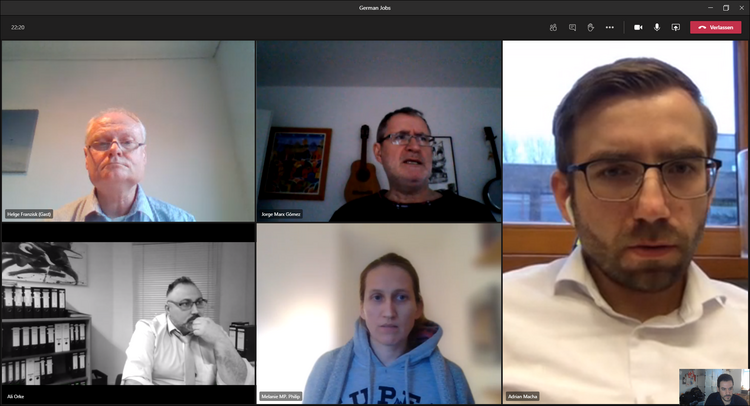
More at: uol.de/vlba/projekte/ifb-ag





